Organizational Behavior: Culture, Power, and Motivation
VerifiedAdded on 2023/01/12
|21
|6736
|20
AI Summary
This document explores the impact of organizational culture, power dynamics, and motivation on employee behavior and performance. It includes a case study of The Bloomsbury hotel and discusses various theories and models related to organizational behavior.
Contribute Materials
Your contribution can guide someone’s learning journey. Share your
documents today.
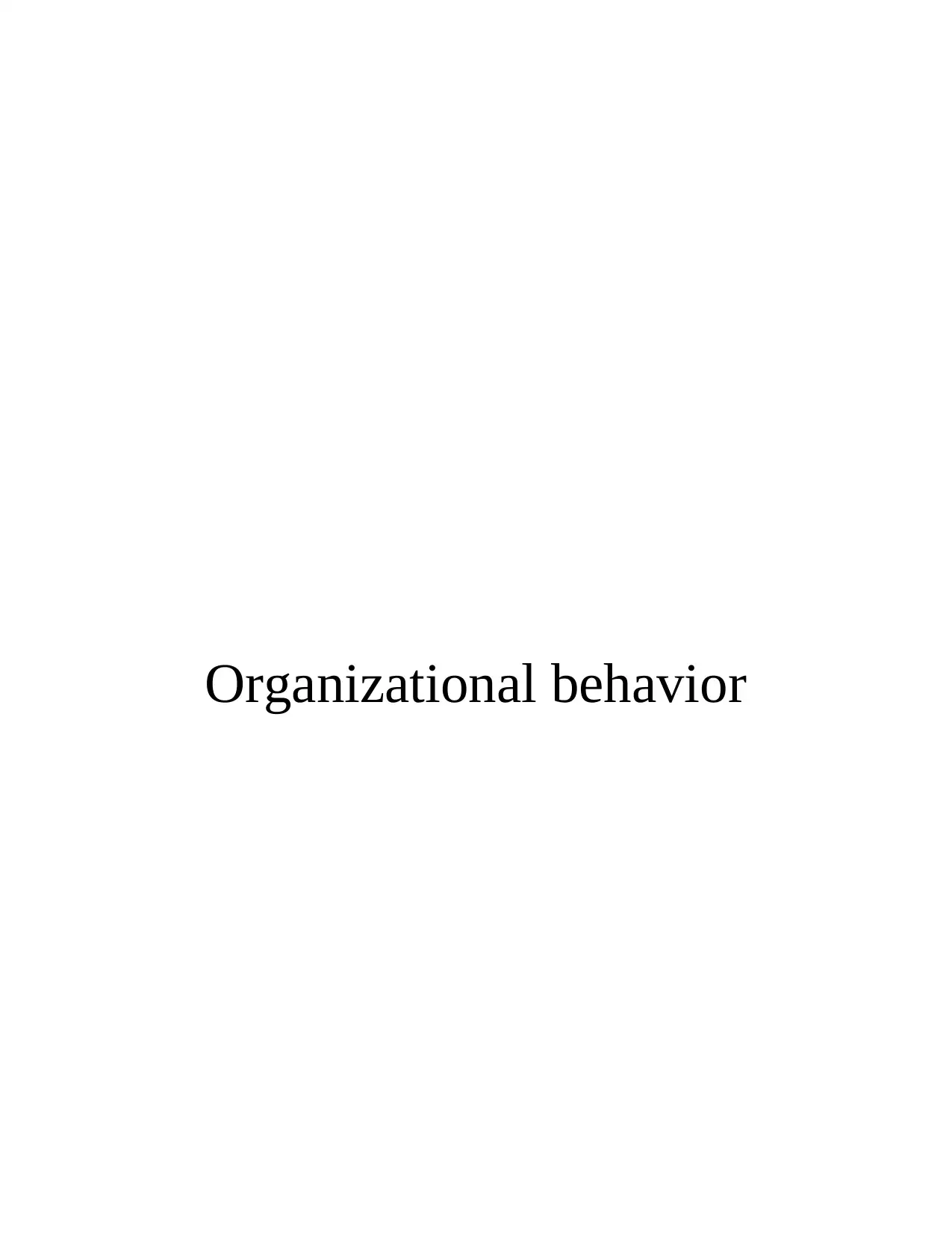
Organizational behavior
Secure Best Marks with AI Grader
Need help grading? Try our AI Grader for instant feedback on your assignments.
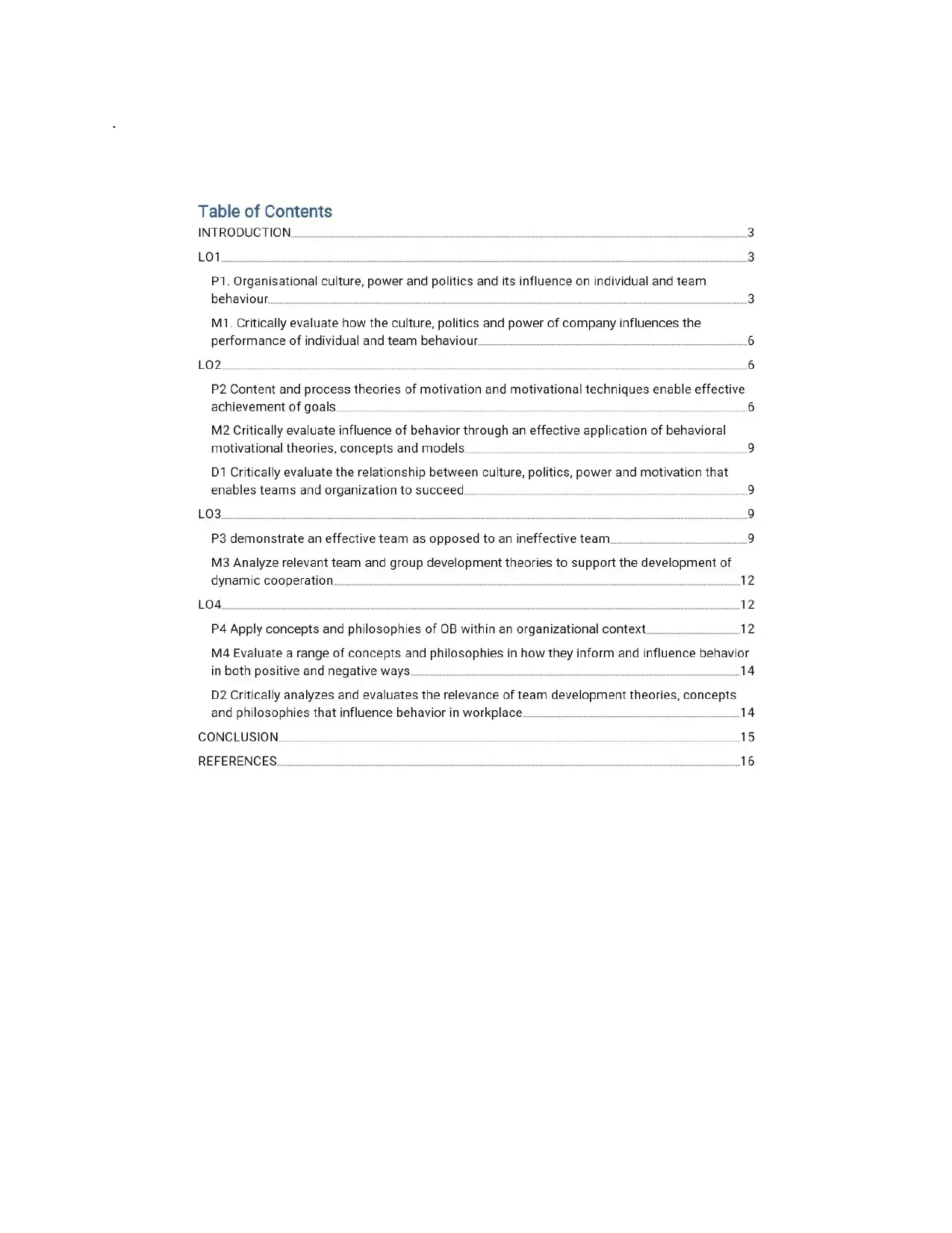
.
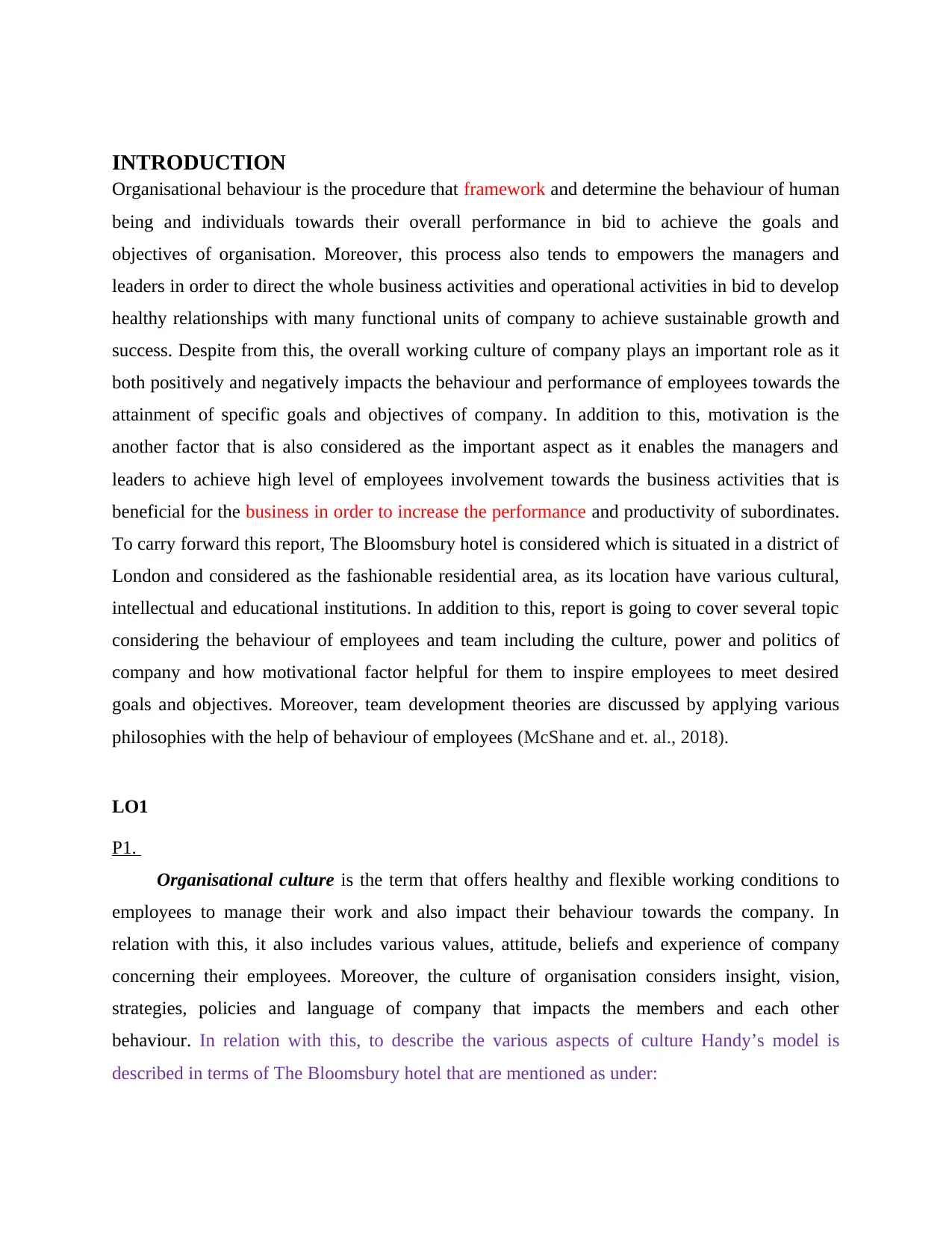
INTRODUCTION
Organisational behaviour is the procedure that framework and determine the behaviour of human
being and individuals towards their overall performance in bid to achieve the goals and
objectives of organisation. Moreover, this process also tends to empowers the managers and
leaders in order to direct the whole business activities and operational activities in bid to develop
healthy relationships with many functional units of company to achieve sustainable growth and
success. Despite from this, the overall working culture of company plays an important role as it
both positively and negatively impacts the behaviour and performance of employees towards the
attainment of specific goals and objectives of company. In addition to this, motivation is the
another factor that is also considered as the important aspect as it enables the managers and
leaders to achieve high level of employees involvement towards the business activities that is
beneficial for the business in order to increase the performance and productivity of subordinates.
To carry forward this report, The Bloomsbury hotel is considered which is situated in a district of
London and considered as the fashionable residential area, as its location have various cultural,
intellectual and educational institutions. In addition to this, report is going to cover several topic
considering the behaviour of employees and team including the culture, power and politics of
company and how motivational factor helpful for them to inspire employees to meet desired
goals and objectives. Moreover, team development theories are discussed by applying various
philosophies with the help of behaviour of employees (McShane and et. al., 2018).
LO1
P1.
Organisational culture is the term that offers healthy and flexible working conditions to
employees to manage their work and also impact their behaviour towards the company. In
relation with this, it also includes various values, attitude, beliefs and experience of company
concerning their employees. Moreover, the culture of organisation considers insight, vision,
strategies, policies and language of company that impacts the members and each other
behaviour. In relation with this, to describe the various aspects of culture Handy’s model is
described in terms of The Bloomsbury hotel that are mentioned as under:
Organisational behaviour is the procedure that framework and determine the behaviour of human
being and individuals towards their overall performance in bid to achieve the goals and
objectives of organisation. Moreover, this process also tends to empowers the managers and
leaders in order to direct the whole business activities and operational activities in bid to develop
healthy relationships with many functional units of company to achieve sustainable growth and
success. Despite from this, the overall working culture of company plays an important role as it
both positively and negatively impacts the behaviour and performance of employees towards the
attainment of specific goals and objectives of company. In addition to this, motivation is the
another factor that is also considered as the important aspect as it enables the managers and
leaders to achieve high level of employees involvement towards the business activities that is
beneficial for the business in order to increase the performance and productivity of subordinates.
To carry forward this report, The Bloomsbury hotel is considered which is situated in a district of
London and considered as the fashionable residential area, as its location have various cultural,
intellectual and educational institutions. In addition to this, report is going to cover several topic
considering the behaviour of employees and team including the culture, power and politics of
company and how motivational factor helpful for them to inspire employees to meet desired
goals and objectives. Moreover, team development theories are discussed by applying various
philosophies with the help of behaviour of employees (McShane and et. al., 2018).
LO1
P1.
Organisational culture is the term that offers healthy and flexible working conditions to
employees to manage their work and also impact their behaviour towards the company. In
relation with this, it also includes various values, attitude, beliefs and experience of company
concerning their employees. Moreover, the culture of organisation considers insight, vision,
strategies, policies and language of company that impacts the members and each other
behaviour. In relation with this, to describe the various aspects of culture Handy’s model is
described in terms of The Bloomsbury hotel that are mentioned as under:
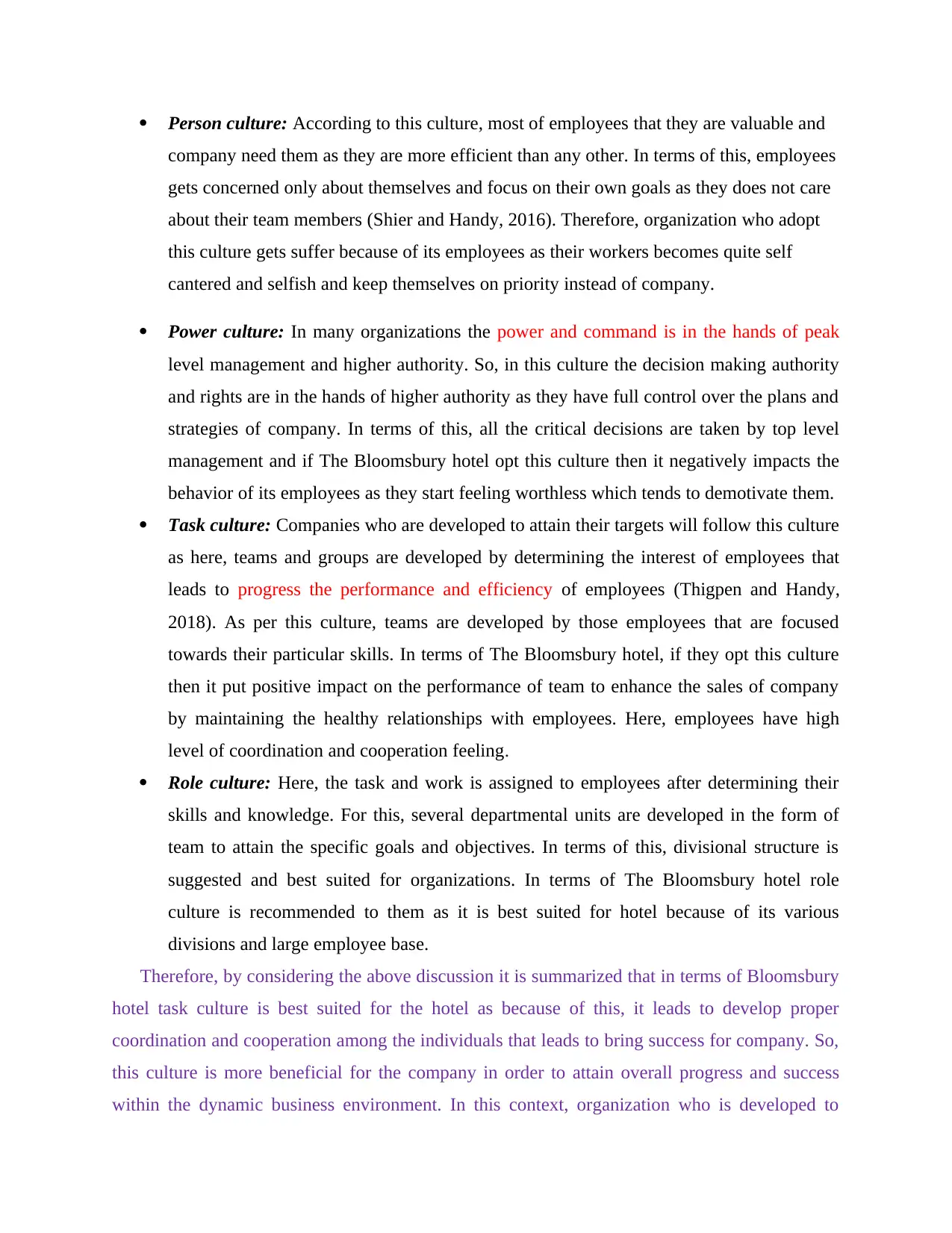
Person culture: According to this culture, most of employees that they are valuable and
company need them as they are more efficient than any other. In terms of this, employees
gets concerned only about themselves and focus on their own goals as they does not care
about their team members (Shier and Handy, 2016). Therefore, organization who adopt
this culture gets suffer because of its employees as their workers becomes quite self
cantered and selfish and keep themselves on priority instead of company.
Power culture: In many organizations the power and command is in the hands of peak
level management and higher authority. So, in this culture the decision making authority
and rights are in the hands of higher authority as they have full control over the plans and
strategies of company. In terms of this, all the critical decisions are taken by top level
management and if The Bloomsbury hotel opt this culture then it negatively impacts the
behavior of its employees as they start feeling worthless which tends to demotivate them.
Task culture: Companies who are developed to attain their targets will follow this culture
as here, teams and groups are developed by determining the interest of employees that
leads to progress the performance and efficiency of employees (Thigpen and Handy,
2018). As per this culture, teams are developed by those employees that are focused
towards their particular skills. In terms of The Bloomsbury hotel, if they opt this culture
then it put positive impact on the performance of team to enhance the sales of company
by maintaining the healthy relationships with employees. Here, employees have high
level of coordination and cooperation feeling.
Role culture: Here, the task and work is assigned to employees after determining their
skills and knowledge. For this, several departmental units are developed in the form of
team to attain the specific goals and objectives. In terms of this, divisional structure is
suggested and best suited for organizations. In terms of The Bloomsbury hotel role
culture is recommended to them as it is best suited for hotel because of its various
divisions and large employee base.
Therefore, by considering the above discussion it is summarized that in terms of Bloomsbury
hotel task culture is best suited for the hotel as because of this, it leads to develop proper
coordination and cooperation among the individuals that leads to bring success for company. So,
this culture is more beneficial for the company in order to attain overall progress and success
within the dynamic business environment. In this context, organization who is developed to
company need them as they are more efficient than any other. In terms of this, employees
gets concerned only about themselves and focus on their own goals as they does not care
about their team members (Shier and Handy, 2016). Therefore, organization who adopt
this culture gets suffer because of its employees as their workers becomes quite self
cantered and selfish and keep themselves on priority instead of company.
Power culture: In many organizations the power and command is in the hands of peak
level management and higher authority. So, in this culture the decision making authority
and rights are in the hands of higher authority as they have full control over the plans and
strategies of company. In terms of this, all the critical decisions are taken by top level
management and if The Bloomsbury hotel opt this culture then it negatively impacts the
behavior of its employees as they start feeling worthless which tends to demotivate them.
Task culture: Companies who are developed to attain their targets will follow this culture
as here, teams and groups are developed by determining the interest of employees that
leads to progress the performance and efficiency of employees (Thigpen and Handy,
2018). As per this culture, teams are developed by those employees that are focused
towards their particular skills. In terms of The Bloomsbury hotel, if they opt this culture
then it put positive impact on the performance of team to enhance the sales of company
by maintaining the healthy relationships with employees. Here, employees have high
level of coordination and cooperation feeling.
Role culture: Here, the task and work is assigned to employees after determining their
skills and knowledge. For this, several departmental units are developed in the form of
team to attain the specific goals and objectives. In terms of this, divisional structure is
suggested and best suited for organizations. In terms of The Bloomsbury hotel role
culture is recommended to them as it is best suited for hotel because of its various
divisions and large employee base.
Therefore, by considering the above discussion it is summarized that in terms of Bloomsbury
hotel task culture is best suited for the hotel as because of this, it leads to develop proper
coordination and cooperation among the individuals that leads to bring success for company. So,
this culture is more beneficial for the company in order to attain overall progress and success
within the dynamic business environment. In this context, organization who is developed to
Secure Best Marks with AI Grader
Need help grading? Try our AI Grader for instant feedback on your assignments.
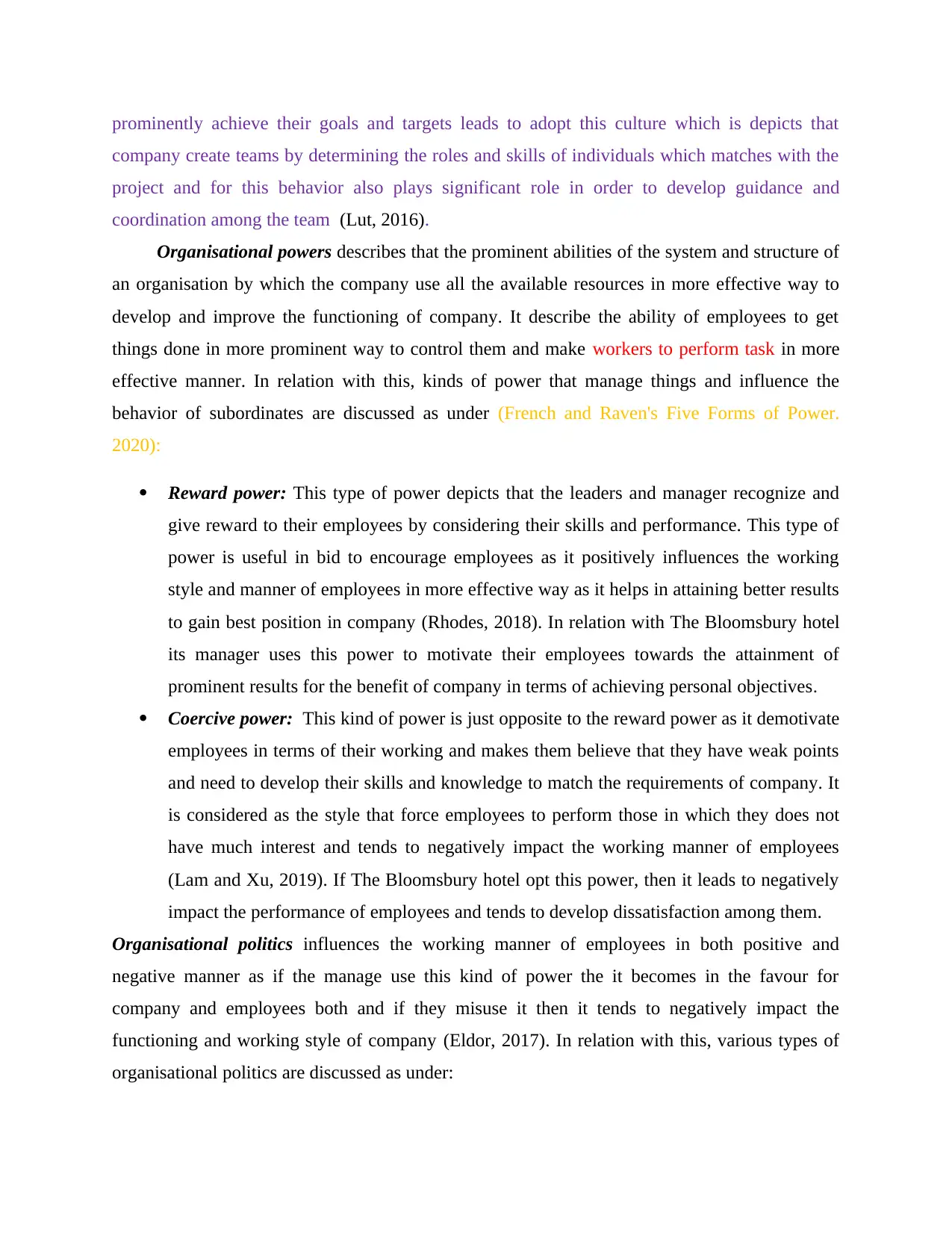
prominently achieve their goals and targets leads to adopt this culture which is depicts that
company create teams by determining the roles and skills of individuals which matches with the
project and for this behavior also plays significant role in order to develop guidance and
coordination among the team (Lut, 2016).
Organisational powers describes that the prominent abilities of the system and structure of
an organisation by which the company use all the available resources in more effective way to
develop and improve the functioning of company. It describe the ability of employees to get
things done in more prominent way to control them and make workers to perform task in more
effective manner. In relation with this, kinds of power that manage things and influence the
behavior of subordinates are discussed as under (French and Raven's Five Forms of Power.
2020):
Reward power: This type of power depicts that the leaders and manager recognize and
give reward to their employees by considering their skills and performance. This type of
power is useful in bid to encourage employees as it positively influences the working
style and manner of employees in more effective way as it helps in attaining better results
to gain best position in company (Rhodes, 2018). In relation with The Bloomsbury hotel
its manager uses this power to motivate their employees towards the attainment of
prominent results for the benefit of company in terms of achieving personal objectives.
Coercive power: This kind of power is just opposite to the reward power as it demotivate
employees in terms of their working and makes them believe that they have weak points
and need to develop their skills and knowledge to match the requirements of company. It
is considered as the style that force employees to perform those in which they does not
have much interest and tends to negatively impact the working manner of employees
(Lam and Xu, 2019). If The Bloomsbury hotel opt this power, then it leads to negatively
impact the performance of employees and tends to develop dissatisfaction among them.
Organisational politics influences the working manner of employees in both positive and
negative manner as if the manage use this kind of power the it becomes in the favour for
company and employees both and if they misuse it then it tends to negatively impact the
functioning and working style of company (Eldor, 2017). In relation with this, various types of
organisational politics are discussed as under:
company create teams by determining the roles and skills of individuals which matches with the
project and for this behavior also plays significant role in order to develop guidance and
coordination among the team (Lut, 2016).
Organisational powers describes that the prominent abilities of the system and structure of
an organisation by which the company use all the available resources in more effective way to
develop and improve the functioning of company. It describe the ability of employees to get
things done in more prominent way to control them and make workers to perform task in more
effective manner. In relation with this, kinds of power that manage things and influence the
behavior of subordinates are discussed as under (French and Raven's Five Forms of Power.
2020):
Reward power: This type of power depicts that the leaders and manager recognize and
give reward to their employees by considering their skills and performance. This type of
power is useful in bid to encourage employees as it positively influences the working
style and manner of employees in more effective way as it helps in attaining better results
to gain best position in company (Rhodes, 2018). In relation with The Bloomsbury hotel
its manager uses this power to motivate their employees towards the attainment of
prominent results for the benefit of company in terms of achieving personal objectives.
Coercive power: This kind of power is just opposite to the reward power as it demotivate
employees in terms of their working and makes them believe that they have weak points
and need to develop their skills and knowledge to match the requirements of company. It
is considered as the style that force employees to perform those in which they does not
have much interest and tends to negatively impact the working manner of employees
(Lam and Xu, 2019). If The Bloomsbury hotel opt this power, then it leads to negatively
impact the performance of employees and tends to develop dissatisfaction among them.
Organisational politics influences the working manner of employees in both positive and
negative manner as if the manage use this kind of power the it becomes in the favour for
company and employees both and if they misuse it then it tends to negatively impact the
functioning and working style of company (Eldor, 2017). In relation with this, various types of
organisational politics are discussed as under:
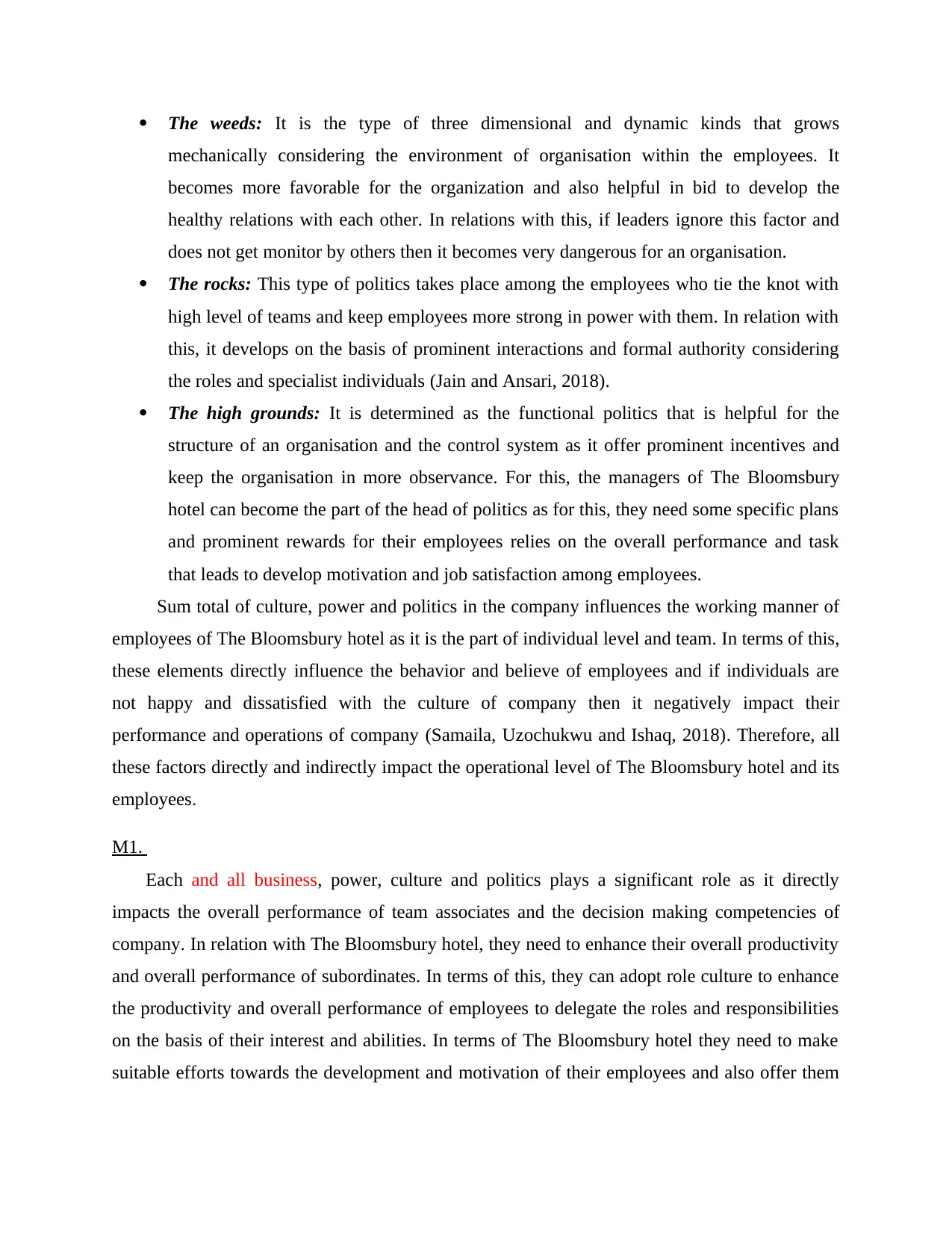
The weeds: It is the type of three dimensional and dynamic kinds that grows
mechanically considering the environment of organisation within the employees. It
becomes more favorable for the organization and also helpful in bid to develop the
healthy relations with each other. In relations with this, if leaders ignore this factor and
does not get monitor by others then it becomes very dangerous for an organisation.
The rocks: This type of politics takes place among the employees who tie the knot with
high level of teams and keep employees more strong in power with them. In relation with
this, it develops on the basis of prominent interactions and formal authority considering
the roles and specialist individuals (Jain and Ansari, 2018).
The high grounds: It is determined as the functional politics that is helpful for the
structure of an organisation and the control system as it offer prominent incentives and
keep the organisation in more observance. For this, the managers of The Bloomsbury
hotel can become the part of the head of politics as for this, they need some specific plans
and prominent rewards for their employees relies on the overall performance and task
that leads to develop motivation and job satisfaction among employees.
Sum total of culture, power and politics in the company influences the working manner of
employees of The Bloomsbury hotel as it is the part of individual level and team. In terms of this,
these elements directly influence the behavior and believe of employees and if individuals are
not happy and dissatisfied with the culture of company then it negatively impact their
performance and operations of company (Samaila, Uzochukwu and Ishaq, 2018). Therefore, all
these factors directly and indirectly impact the operational level of The Bloomsbury hotel and its
employees.
M1.
Each and all business, power, culture and politics plays a significant role as it directly
impacts the overall performance of team associates and the decision making competencies of
company. In relation with The Bloomsbury hotel, they need to enhance their overall productivity
and overall performance of subordinates. In terms of this, they can adopt role culture to enhance
the productivity and overall performance of employees to delegate the roles and responsibilities
on the basis of their interest and abilities. In terms of The Bloomsbury hotel they need to make
suitable efforts towards the development and motivation of their employees and also offer them
mechanically considering the environment of organisation within the employees. It
becomes more favorable for the organization and also helpful in bid to develop the
healthy relations with each other. In relations with this, if leaders ignore this factor and
does not get monitor by others then it becomes very dangerous for an organisation.
The rocks: This type of politics takes place among the employees who tie the knot with
high level of teams and keep employees more strong in power with them. In relation with
this, it develops on the basis of prominent interactions and formal authority considering
the roles and specialist individuals (Jain and Ansari, 2018).
The high grounds: It is determined as the functional politics that is helpful for the
structure of an organisation and the control system as it offer prominent incentives and
keep the organisation in more observance. For this, the managers of The Bloomsbury
hotel can become the part of the head of politics as for this, they need some specific plans
and prominent rewards for their employees relies on the overall performance and task
that leads to develop motivation and job satisfaction among employees.
Sum total of culture, power and politics in the company influences the working manner of
employees of The Bloomsbury hotel as it is the part of individual level and team. In terms of this,
these elements directly influence the behavior and believe of employees and if individuals are
not happy and dissatisfied with the culture of company then it negatively impact their
performance and operations of company (Samaila, Uzochukwu and Ishaq, 2018). Therefore, all
these factors directly and indirectly impact the operational level of The Bloomsbury hotel and its
employees.
M1.
Each and all business, power, culture and politics plays a significant role as it directly
impacts the overall performance of team associates and the decision making competencies of
company. In relation with The Bloomsbury hotel, they need to enhance their overall productivity
and overall performance of subordinates. In terms of this, they can adopt role culture to enhance
the productivity and overall performance of employees to delegate the roles and responsibilities
on the basis of their interest and abilities. In terms of The Bloomsbury hotel they need to make
suitable efforts towards the development and motivation of their employees and also offer them
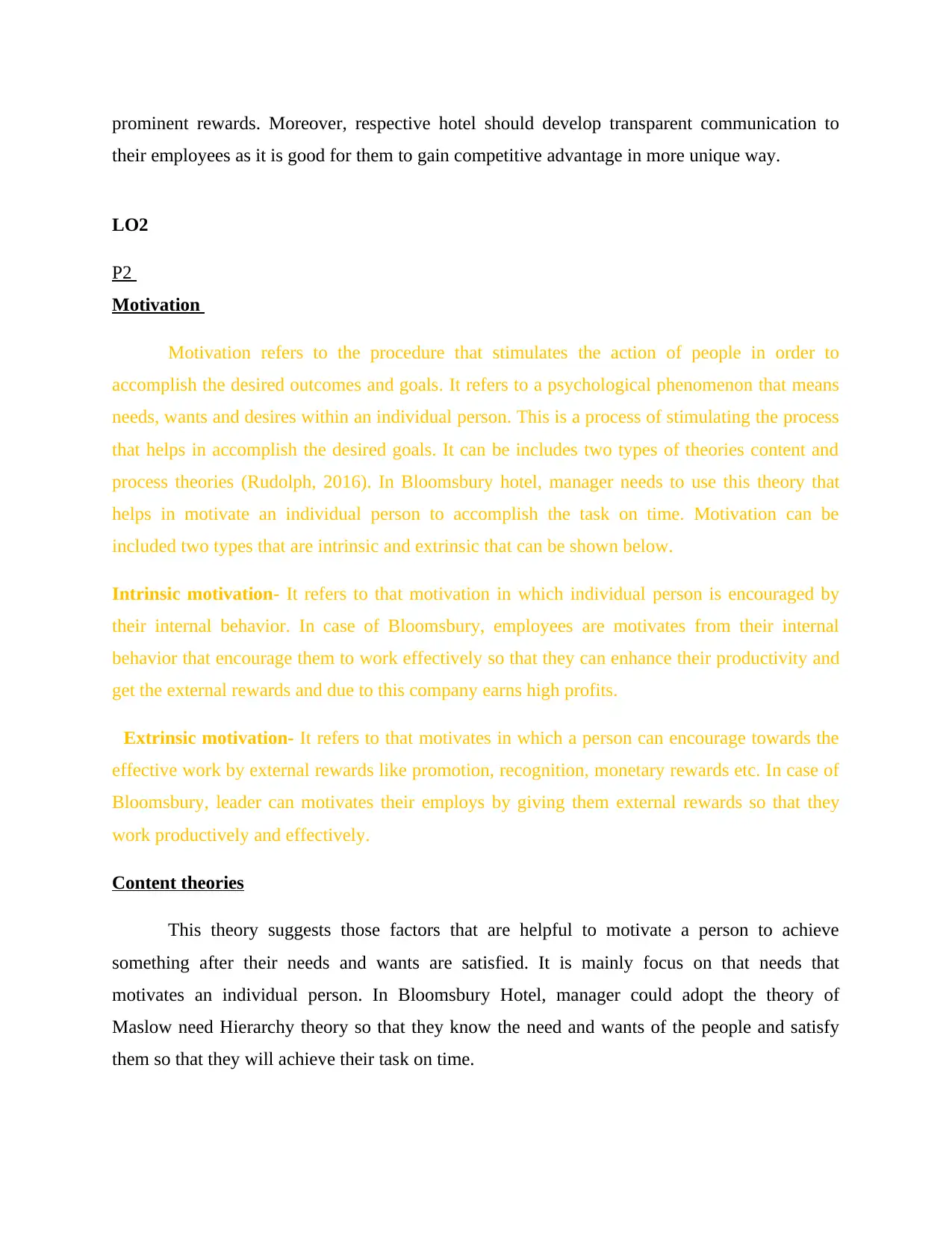
prominent rewards. Moreover, respective hotel should develop transparent communication to
their employees as it is good for them to gain competitive advantage in more unique way.
LO2
P2
Motivation
Motivation refers to the procedure that stimulates the action of people in order to
accomplish the desired outcomes and goals. It refers to a psychological phenomenon that means
needs, wants and desires within an individual person. This is a process of stimulating the process
that helps in accomplish the desired goals. It can be includes two types of theories content and
process theories (Rudolph, 2016). In Bloomsbury hotel, manager needs to use this theory that
helps in motivate an individual person to accomplish the task on time. Motivation can be
included two types that are intrinsic and extrinsic that can be shown below.
Intrinsic motivation- It refers to that motivation in which individual person is encouraged by
their internal behavior. In case of Bloomsbury, employees are motivates from their internal
behavior that encourage them to work effectively so that they can enhance their productivity and
get the external rewards and due to this company earns high profits.
Extrinsic motivation- It refers to that motivates in which a person can encourage towards the
effective work by external rewards like promotion, recognition, monetary rewards etc. In case of
Bloomsbury, leader can motivates their employs by giving them external rewards so that they
work productively and effectively.
Content theories
This theory suggests those factors that are helpful to motivate a person to achieve
something after their needs and wants are satisfied. It is mainly focus on that needs that
motivates an individual person. In Bloomsbury Hotel, manager could adopt the theory of
Maslow need Hierarchy theory so that they know the need and wants of the people and satisfy
them so that they will achieve their task on time.
their employees as it is good for them to gain competitive advantage in more unique way.
LO2
P2
Motivation
Motivation refers to the procedure that stimulates the action of people in order to
accomplish the desired outcomes and goals. It refers to a psychological phenomenon that means
needs, wants and desires within an individual person. This is a process of stimulating the process
that helps in accomplish the desired goals. It can be includes two types of theories content and
process theories (Rudolph, 2016). In Bloomsbury hotel, manager needs to use this theory that
helps in motivate an individual person to accomplish the task on time. Motivation can be
included two types that are intrinsic and extrinsic that can be shown below.
Intrinsic motivation- It refers to that motivation in which individual person is encouraged by
their internal behavior. In case of Bloomsbury, employees are motivates from their internal
behavior that encourage them to work effectively so that they can enhance their productivity and
get the external rewards and due to this company earns high profits.
Extrinsic motivation- It refers to that motivates in which a person can encourage towards the
effective work by external rewards like promotion, recognition, monetary rewards etc. In case of
Bloomsbury, leader can motivates their employs by giving them external rewards so that they
work productively and effectively.
Content theories
This theory suggests those factors that are helpful to motivate a person to achieve
something after their needs and wants are satisfied. It is mainly focus on that needs that
motivates an individual person. In Bloomsbury Hotel, manager could adopt the theory of
Maslow need Hierarchy theory so that they know the need and wants of the people and satisfy
them so that they will achieve their task on time.
Paraphrase This Document
Need a fresh take? Get an instant paraphrase of this document with our AI Paraphraser
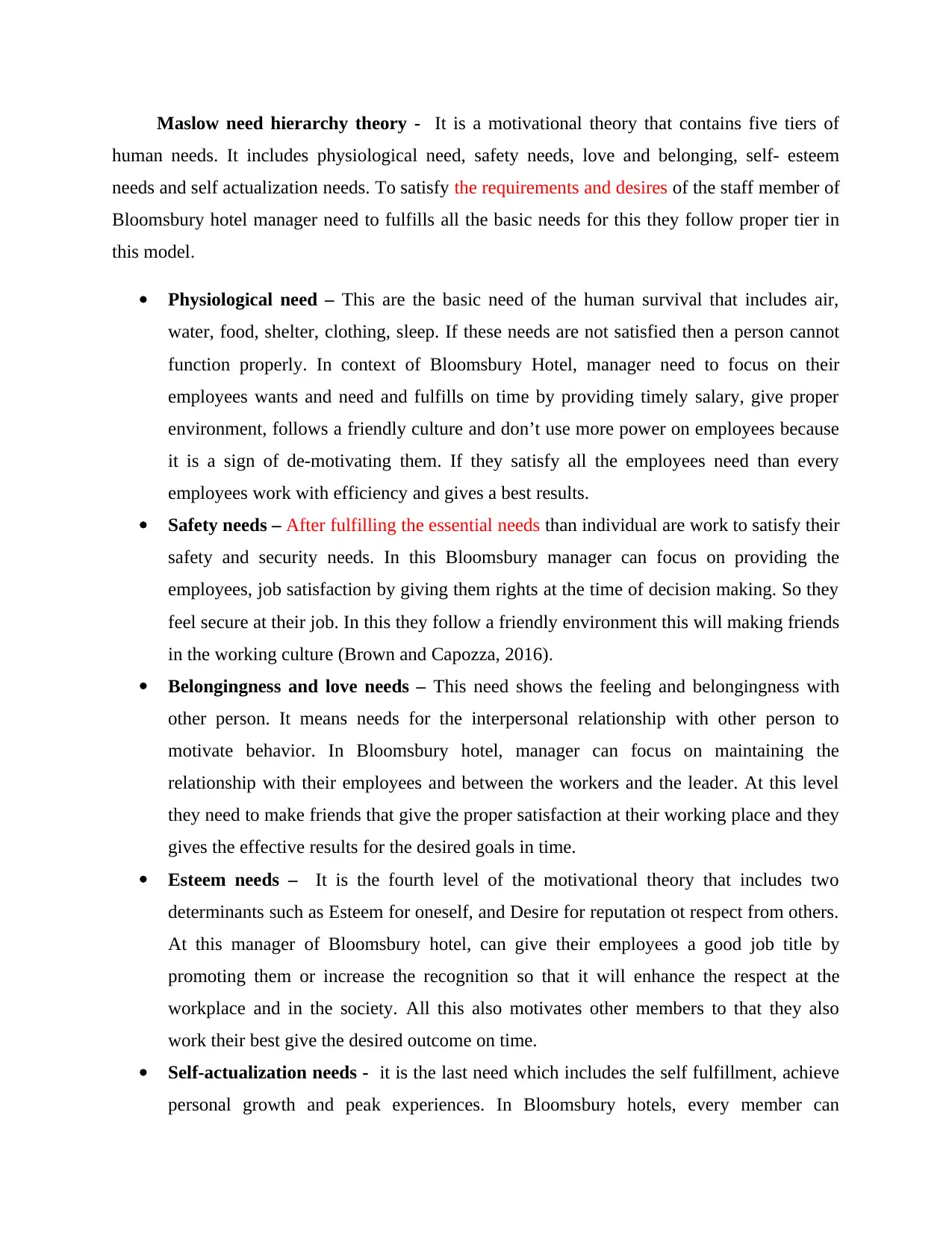
Maslow need hierarchy theory - It is a motivational theory that contains five tiers of
human needs. It includes physiological need, safety needs, love and belonging, self- esteem
needs and self actualization needs. To satisfy the requirements and desires of the staff member of
Bloomsbury hotel manager need to fulfills all the basic needs for this they follow proper tier in
this model.
Physiological need – This are the basic need of the human survival that includes air,
water, food, shelter, clothing, sleep. If these needs are not satisfied then a person cannot
function properly. In context of Bloomsbury Hotel, manager need to focus on their
employees wants and need and fulfills on time by providing timely salary, give proper
environment, follows a friendly culture and don’t use more power on employees because
it is a sign of de-motivating them. If they satisfy all the employees need than every
employees work with efficiency and gives a best results.
Safety needs – After fulfilling the essential needs than individual are work to satisfy their
safety and security needs. In this Bloomsbury manager can focus on providing the
employees, job satisfaction by giving them rights at the time of decision making. So they
feel secure at their job. In this they follow a friendly environment this will making friends
in the working culture (Brown and Capozza, 2016).
Belongingness and love needs – This need shows the feeling and belongingness with
other person. It means needs for the interpersonal relationship with other person to
motivate behavior. In Bloomsbury hotel, manager can focus on maintaining the
relationship with their employees and between the workers and the leader. At this level
they need to make friends that give the proper satisfaction at their working place and they
gives the effective results for the desired goals in time.
Esteem needs – It is the fourth level of the motivational theory that includes two
determinants such as Esteem for oneself, and Desire for reputation ot respect from others.
At this manager of Bloomsbury hotel, can give their employees a good job title by
promoting them or increase the recognition so that it will enhance the respect at the
workplace and in the society. All this also motivates other members to that they also
work their best give the desired outcome on time.
Self-actualization needs - it is the last need which includes the self fulfillment, achieve
personal growth and peak experiences. In Bloomsbury hotels, every member can
human needs. It includes physiological need, safety needs, love and belonging, self- esteem
needs and self actualization needs. To satisfy the requirements and desires of the staff member of
Bloomsbury hotel manager need to fulfills all the basic needs for this they follow proper tier in
this model.
Physiological need – This are the basic need of the human survival that includes air,
water, food, shelter, clothing, sleep. If these needs are not satisfied then a person cannot
function properly. In context of Bloomsbury Hotel, manager need to focus on their
employees wants and need and fulfills on time by providing timely salary, give proper
environment, follows a friendly culture and don’t use more power on employees because
it is a sign of de-motivating them. If they satisfy all the employees need than every
employees work with efficiency and gives a best results.
Safety needs – After fulfilling the essential needs than individual are work to satisfy their
safety and security needs. In this Bloomsbury manager can focus on providing the
employees, job satisfaction by giving them rights at the time of decision making. So they
feel secure at their job. In this they follow a friendly environment this will making friends
in the working culture (Brown and Capozza, 2016).
Belongingness and love needs – This need shows the feeling and belongingness with
other person. It means needs for the interpersonal relationship with other person to
motivate behavior. In Bloomsbury hotel, manager can focus on maintaining the
relationship with their employees and between the workers and the leader. At this level
they need to make friends that give the proper satisfaction at their working place and they
gives the effective results for the desired goals in time.
Esteem needs – It is the fourth level of the motivational theory that includes two
determinants such as Esteem for oneself, and Desire for reputation ot respect from others.
At this manager of Bloomsbury hotel, can give their employees a good job title by
promoting them or increase the recognition so that it will enhance the respect at the
workplace and in the society. All this also motivates other members to that they also
work their best give the desired outcome on time.
Self-actualization needs - it is the last need which includes the self fulfillment, achieve
personal growth and peak experiences. In Bloomsbury hotels, every member can
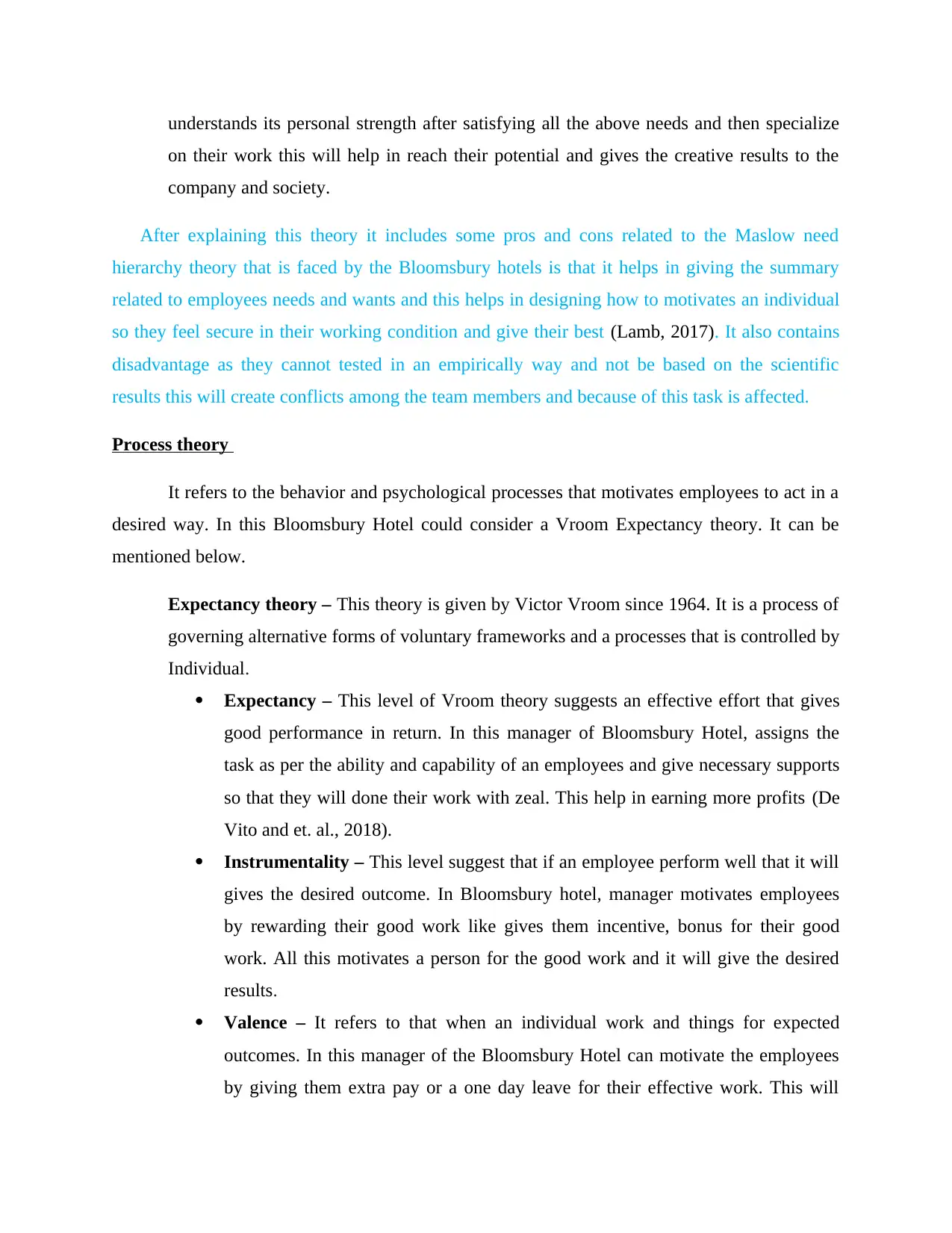
understands its personal strength after satisfying all the above needs and then specialize
on their work this will help in reach their potential and gives the creative results to the
company and society.
After explaining this theory it includes some pros and cons related to the Maslow need
hierarchy theory that is faced by the Bloomsbury hotels is that it helps in giving the summary
related to employees needs and wants and this helps in designing how to motivates an individual
so they feel secure in their working condition and give their best (Lamb, 2017). It also contains
disadvantage as they cannot tested in an empirically way and not be based on the scientific
results this will create conflicts among the team members and because of this task is affected.
Process theory
It refers to the behavior and psychological processes that motivates employees to act in a
desired way. In this Bloomsbury Hotel could consider a Vroom Expectancy theory. It can be
mentioned below.
Expectancy theory – This theory is given by Victor Vroom since 1964. It is a process of
governing alternative forms of voluntary frameworks and a processes that is controlled by
Individual.
Expectancy – This level of Vroom theory suggests an effective effort that gives
good performance in return. In this manager of Bloomsbury Hotel, assigns the
task as per the ability and capability of an employees and give necessary supports
so that they will done their work with zeal. This help in earning more profits (De
Vito and et. al., 2018).
Instrumentality – This level suggest that if an employee perform well that it will
gives the desired outcome. In Bloomsbury hotel, manager motivates employees
by rewarding their good work like gives them incentive, bonus for their good
work. All this motivates a person for the good work and it will give the desired
results.
Valence – It refers to that when an individual work and things for expected
outcomes. In this manager of the Bloomsbury Hotel can motivate the employees
by giving them extra pay or a one day leave for their effective work. This will
on their work this will help in reach their potential and gives the creative results to the
company and society.
After explaining this theory it includes some pros and cons related to the Maslow need
hierarchy theory that is faced by the Bloomsbury hotels is that it helps in giving the summary
related to employees needs and wants and this helps in designing how to motivates an individual
so they feel secure in their working condition and give their best (Lamb, 2017). It also contains
disadvantage as they cannot tested in an empirically way and not be based on the scientific
results this will create conflicts among the team members and because of this task is affected.
Process theory
It refers to the behavior and psychological processes that motivates employees to act in a
desired way. In this Bloomsbury Hotel could consider a Vroom Expectancy theory. It can be
mentioned below.
Expectancy theory – This theory is given by Victor Vroom since 1964. It is a process of
governing alternative forms of voluntary frameworks and a processes that is controlled by
Individual.
Expectancy – This level of Vroom theory suggests an effective effort that gives
good performance in return. In this manager of Bloomsbury Hotel, assigns the
task as per the ability and capability of an employees and give necessary supports
so that they will done their work with zeal. This help in earning more profits (De
Vito and et. al., 2018).
Instrumentality – This level suggest that if an employee perform well that it will
gives the desired outcome. In Bloomsbury hotel, manager motivates employees
by rewarding their good work like gives them incentive, bonus for their good
work. All this motivates a person for the good work and it will give the desired
results.
Valence – It refers to that when an individual work and things for expected
outcomes. In this manager of the Bloomsbury Hotel can motivate the employees
by giving them extra pay or a one day leave for their effective work. This will
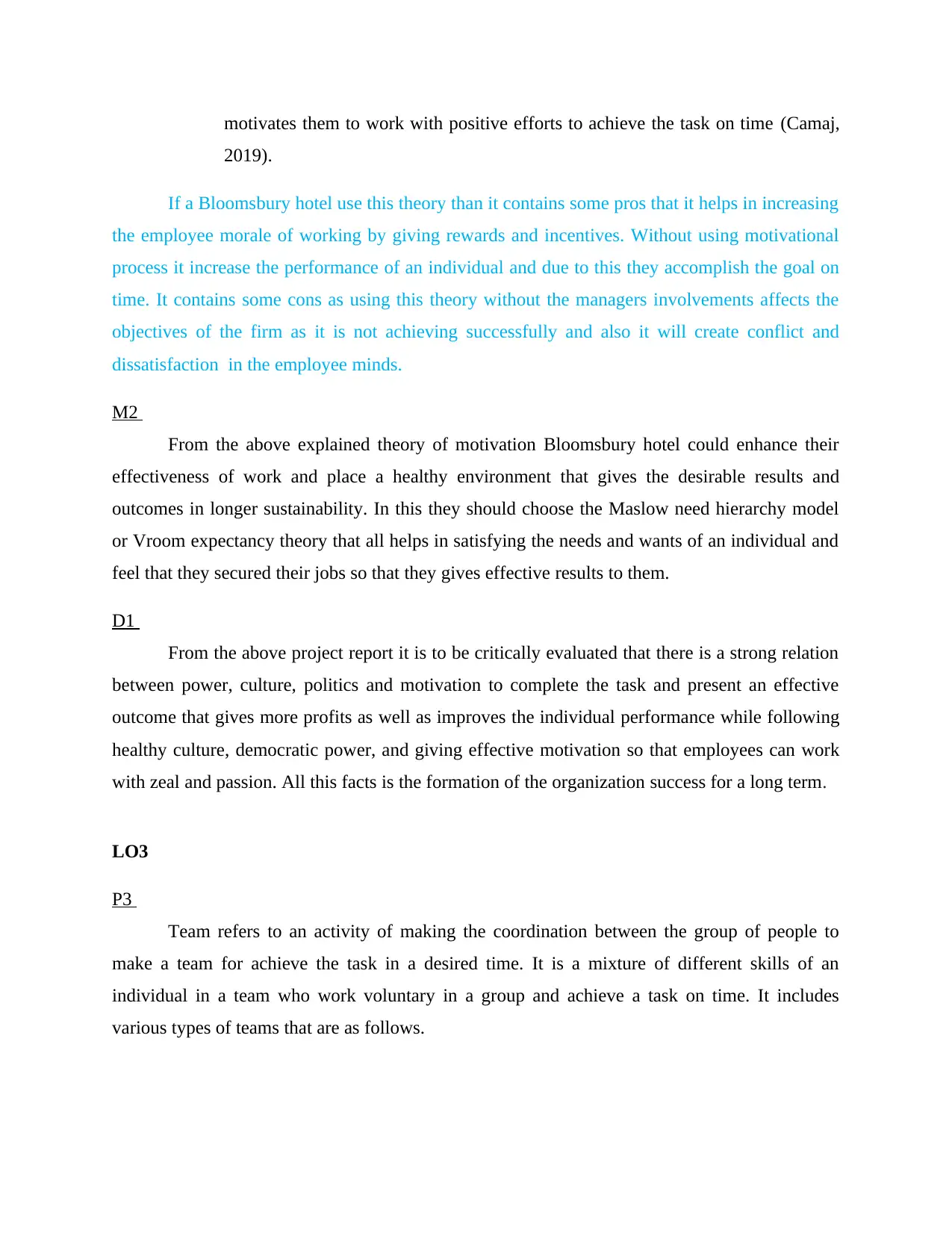
motivates them to work with positive efforts to achieve the task on time (Camaj,
2019).
If a Bloomsbury hotel use this theory than it contains some pros that it helps in increasing
the employee morale of working by giving rewards and incentives. Without using motivational
process it increase the performance of an individual and due to this they accomplish the goal on
time. It contains some cons as using this theory without the managers involvements affects the
objectives of the firm as it is not achieving successfully and also it will create conflict and
dissatisfaction in the employee minds.
M2
From the above explained theory of motivation Bloomsbury hotel could enhance their
effectiveness of work and place a healthy environment that gives the desirable results and
outcomes in longer sustainability. In this they should choose the Maslow need hierarchy model
or Vroom expectancy theory that all helps in satisfying the needs and wants of an individual and
feel that they secured their jobs so that they gives effective results to them.
D1
From the above project report it is to be critically evaluated that there is a strong relation
between power, culture, politics and motivation to complete the task and present an effective
outcome that gives more profits as well as improves the individual performance while following
healthy culture, democratic power, and giving effective motivation so that employees can work
with zeal and passion. All this facts is the formation of the organization success for a long term.
LO3
P3
Team refers to an activity of making the coordination between the group of people to
make a team for achieve the task in a desired time. It is a mixture of different skills of an
individual in a team who work voluntary in a group and achieve a task on time. It includes
various types of teams that are as follows.
2019).
If a Bloomsbury hotel use this theory than it contains some pros that it helps in increasing
the employee morale of working by giving rewards and incentives. Without using motivational
process it increase the performance of an individual and due to this they accomplish the goal on
time. It contains some cons as using this theory without the managers involvements affects the
objectives of the firm as it is not achieving successfully and also it will create conflict and
dissatisfaction in the employee minds.
M2
From the above explained theory of motivation Bloomsbury hotel could enhance their
effectiveness of work and place a healthy environment that gives the desirable results and
outcomes in longer sustainability. In this they should choose the Maslow need hierarchy model
or Vroom expectancy theory that all helps in satisfying the needs and wants of an individual and
feel that they secured their jobs so that they gives effective results to them.
D1
From the above project report it is to be critically evaluated that there is a strong relation
between power, culture, politics and motivation to complete the task and present an effective
outcome that gives more profits as well as improves the individual performance while following
healthy culture, democratic power, and giving effective motivation so that employees can work
with zeal and passion. All this facts is the formation of the organization success for a long term.
LO3
P3
Team refers to an activity of making the coordination between the group of people to
make a team for achieve the task in a desired time. It is a mixture of different skills of an
individual in a team who work voluntary in a group and achieve a task on time. It includes
various types of teams that are as follows.
Secure Best Marks with AI Grader
Need help grading? Try our AI Grader for instant feedback on your assignments.
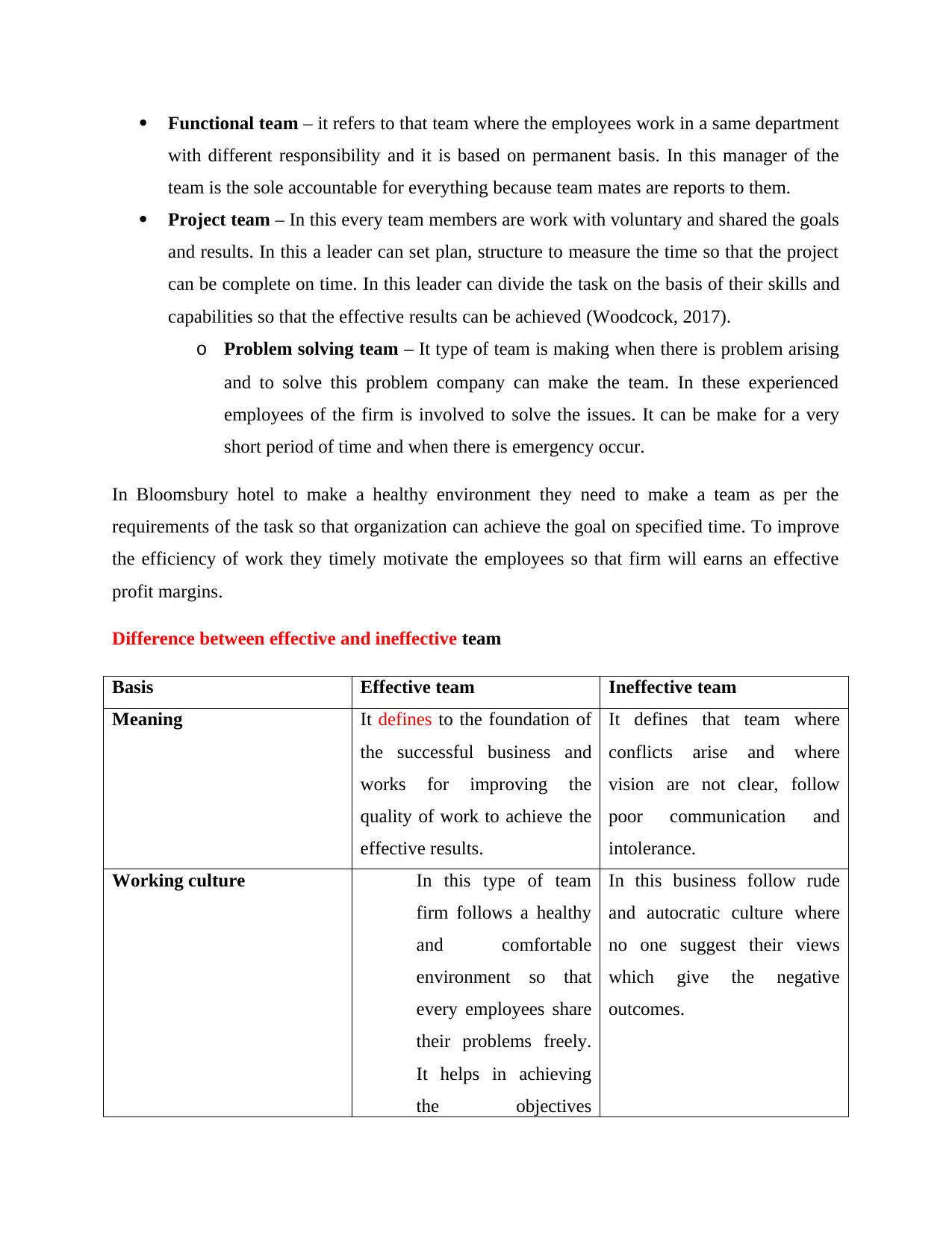
Functional team – it refers to that team where the employees work in a same department
with different responsibility and it is based on permanent basis. In this manager of the
team is the sole accountable for everything because team mates are reports to them.
Project team – In this every team members are work with voluntary and shared the goals
and results. In this a leader can set plan, structure to measure the time so that the project
can be complete on time. In this leader can divide the task on the basis of their skills and
capabilities so that the effective results can be achieved (Woodcock, 2017).
o Problem solving team – It type of team is making when there is problem arising
and to solve this problem company can make the team. In these experienced
employees of the firm is involved to solve the issues. It can be make for a very
short period of time and when there is emergency occur.
In Bloomsbury hotel to make a healthy environment they need to make a team as per the
requirements of the task so that organization can achieve the goal on specified time. To improve
the efficiency of work they timely motivate the employees so that firm will earns an effective
profit margins.
Difference between effective and ineffective team
Basis Effective team Ineffective team
Meaning It defines to the foundation of
the successful business and
works for improving the
quality of work to achieve the
effective results.
It defines that team where
conflicts arise and where
vision are not clear, follow
poor communication and
intolerance.
Working culture In this type of team
firm follows a healthy
and comfortable
environment so that
every employees share
their problems freely.
It helps in achieving
the objectives
In this business follow rude
and autocratic culture where
no one suggest their views
which give the negative
outcomes.
with different responsibility and it is based on permanent basis. In this manager of the
team is the sole accountable for everything because team mates are reports to them.
Project team – In this every team members are work with voluntary and shared the goals
and results. In this a leader can set plan, structure to measure the time so that the project
can be complete on time. In this leader can divide the task on the basis of their skills and
capabilities so that the effective results can be achieved (Woodcock, 2017).
o Problem solving team – It type of team is making when there is problem arising
and to solve this problem company can make the team. In these experienced
employees of the firm is involved to solve the issues. It can be make for a very
short period of time and when there is emergency occur.
In Bloomsbury hotel to make a healthy environment they need to make a team as per the
requirements of the task so that organization can achieve the goal on specified time. To improve
the efficiency of work they timely motivate the employees so that firm will earns an effective
profit margins.
Difference between effective and ineffective team
Basis Effective team Ineffective team
Meaning It defines to the foundation of
the successful business and
works for improving the
quality of work to achieve the
effective results.
It defines that team where
conflicts arise and where
vision are not clear, follow
poor communication and
intolerance.
Working culture In this type of team
firm follows a healthy
and comfortable
environment so that
every employees share
their problems freely.
It helps in achieving
the objectives
In this business follow rude
and autocratic culture where
no one suggest their views
which give the negative
outcomes.
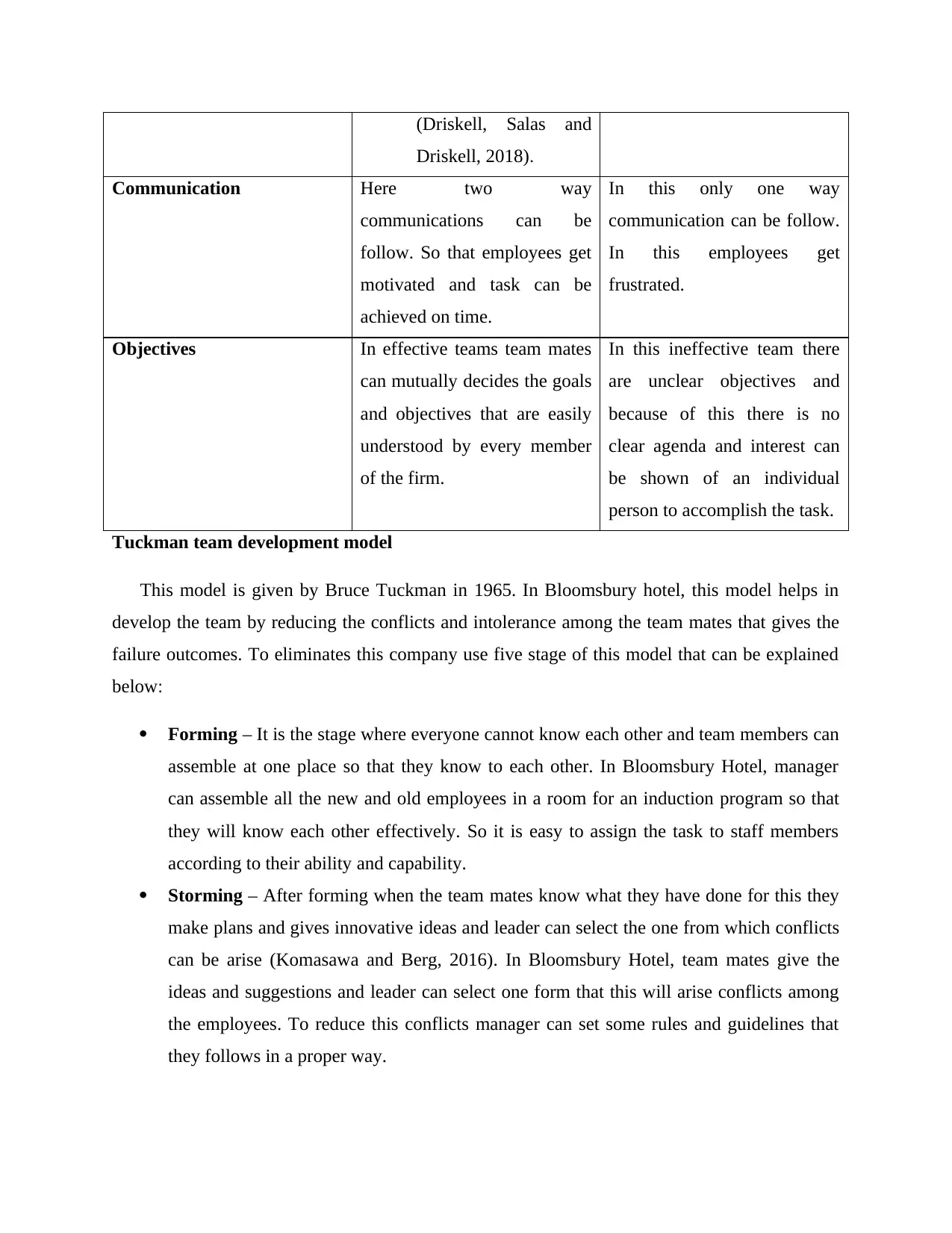
(Driskell, Salas and
Driskell, 2018).
Communication Here two way
communications can be
follow. So that employees get
motivated and task can be
achieved on time.
In this only one way
communication can be follow.
In this employees get
frustrated.
Objectives In effective teams team mates
can mutually decides the goals
and objectives that are easily
understood by every member
of the firm.
In this ineffective team there
are unclear objectives and
because of this there is no
clear agenda and interest can
be shown of an individual
person to accomplish the task.
Tuckman team development model
This model is given by Bruce Tuckman in 1965. In Bloomsbury hotel, this model helps in
develop the team by reducing the conflicts and intolerance among the team mates that gives the
failure outcomes. To eliminates this company use five stage of this model that can be explained
below:
Forming – It is the stage where everyone cannot know each other and team members can
assemble at one place so that they know to each other. In Bloomsbury Hotel, manager
can assemble all the new and old employees in a room for an induction program so that
they will know each other effectively. So it is easy to assign the task to staff members
according to their ability and capability.
Storming – After forming when the team mates know what they have done for this they
make plans and gives innovative ideas and leader can select the one from which conflicts
can be arise (Komasawa and Berg, 2016). In Bloomsbury Hotel, team mates give the
ideas and suggestions and leader can select one form that this will arise conflicts among
the employees. To reduce this conflicts manager can set some rules and guidelines that
they follows in a proper way.
Driskell, 2018).
Communication Here two way
communications can be
follow. So that employees get
motivated and task can be
achieved on time.
In this only one way
communication can be follow.
In this employees get
frustrated.
Objectives In effective teams team mates
can mutually decides the goals
and objectives that are easily
understood by every member
of the firm.
In this ineffective team there
are unclear objectives and
because of this there is no
clear agenda and interest can
be shown of an individual
person to accomplish the task.
Tuckman team development model
This model is given by Bruce Tuckman in 1965. In Bloomsbury hotel, this model helps in
develop the team by reducing the conflicts and intolerance among the team mates that gives the
failure outcomes. To eliminates this company use five stage of this model that can be explained
below:
Forming – It is the stage where everyone cannot know each other and team members can
assemble at one place so that they know to each other. In Bloomsbury Hotel, manager
can assemble all the new and old employees in a room for an induction program so that
they will know each other effectively. So it is easy to assign the task to staff members
according to their ability and capability.
Storming – After forming when the team mates know what they have done for this they
make plans and gives innovative ideas and leader can select the one from which conflicts
can be arise (Komasawa and Berg, 2016). In Bloomsbury Hotel, team mates give the
ideas and suggestions and leader can select one form that this will arise conflicts among
the employees. To reduce this conflicts manager can set some rules and guidelines that
they follows in a proper way.
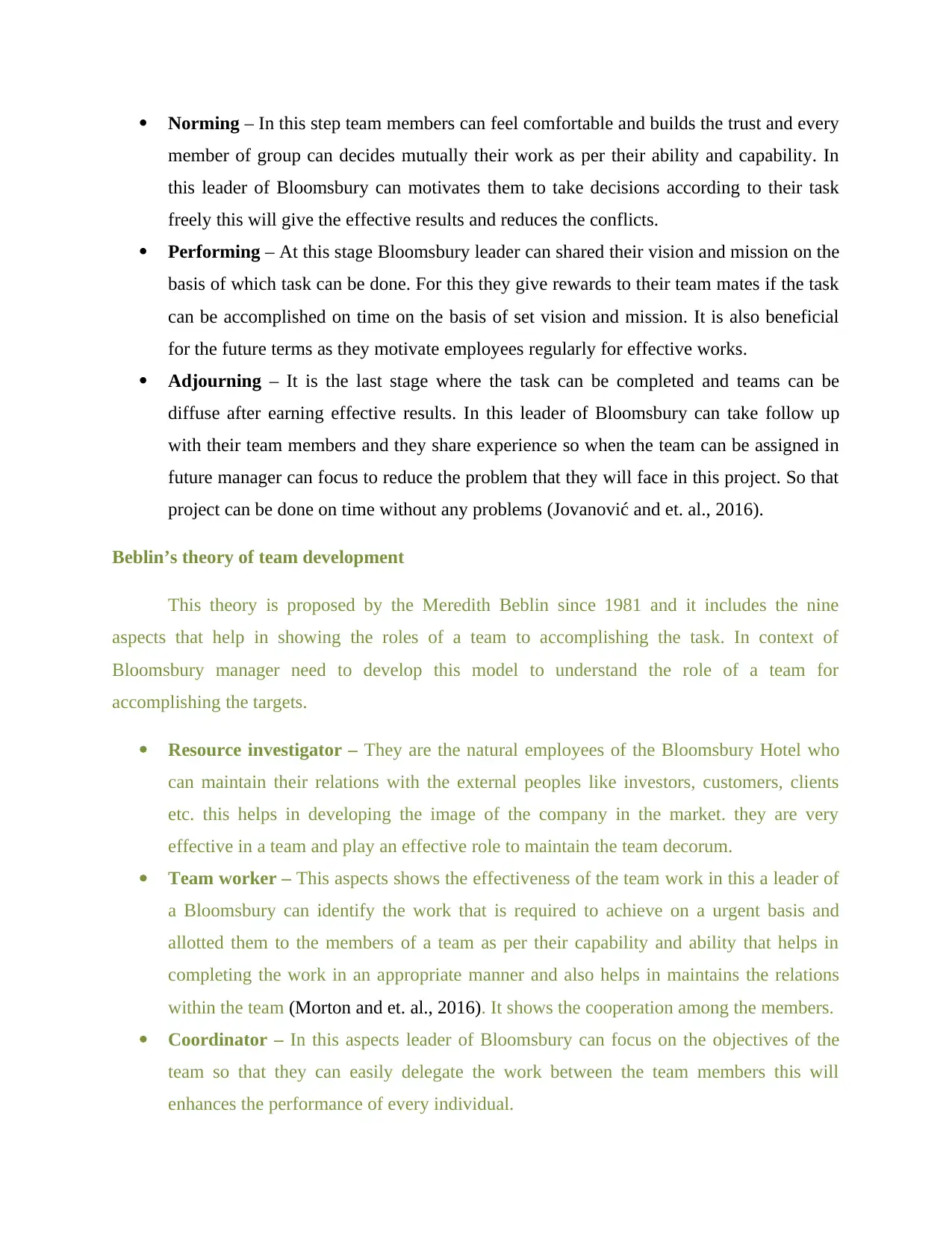
Norming – In this step team members can feel comfortable and builds the trust and every
member of group can decides mutually their work as per their ability and capability. In
this leader of Bloomsbury can motivates them to take decisions according to their task
freely this will give the effective results and reduces the conflicts.
Performing – At this stage Bloomsbury leader can shared their vision and mission on the
basis of which task can be done. For this they give rewards to their team mates if the task
can be accomplished on time on the basis of set vision and mission. It is also beneficial
for the future terms as they motivate employees regularly for effective works.
Adjourning – It is the last stage where the task can be completed and teams can be
diffuse after earning effective results. In this leader of Bloomsbury can take follow up
with their team members and they share experience so when the team can be assigned in
future manager can focus to reduce the problem that they will face in this project. So that
project can be done on time without any problems (Jovanović and et. al., 2016).
Beblin’s theory of team development
This theory is proposed by the Meredith Beblin since 1981 and it includes the nine
aspects that help in showing the roles of a team to accomplishing the task. In context of
Bloomsbury manager need to develop this model to understand the role of a team for
accomplishing the targets.
Resource investigator – They are the natural employees of the Bloomsbury Hotel who
can maintain their relations with the external peoples like investors, customers, clients
etc. this helps in developing the image of the company in the market. they are very
effective in a team and play an effective role to maintain the team decorum.
Team worker – This aspects shows the effectiveness of the team work in this a leader of
a Bloomsbury can identify the work that is required to achieve on a urgent basis and
allotted them to the members of a team as per their capability and ability that helps in
completing the work in an appropriate manner and also helps in maintains the relations
within the team (Morton and et. al., 2016). It shows the cooperation among the members.
Coordinator – In this aspects leader of Bloomsbury can focus on the objectives of the
team so that they can easily delegate the work between the team members this will
enhances the performance of every individual.
member of group can decides mutually their work as per their ability and capability. In
this leader of Bloomsbury can motivates them to take decisions according to their task
freely this will give the effective results and reduces the conflicts.
Performing – At this stage Bloomsbury leader can shared their vision and mission on the
basis of which task can be done. For this they give rewards to their team mates if the task
can be accomplished on time on the basis of set vision and mission. It is also beneficial
for the future terms as they motivate employees regularly for effective works.
Adjourning – It is the last stage where the task can be completed and teams can be
diffuse after earning effective results. In this leader of Bloomsbury can take follow up
with their team members and they share experience so when the team can be assigned in
future manager can focus to reduce the problem that they will face in this project. So that
project can be done on time without any problems (Jovanović and et. al., 2016).
Beblin’s theory of team development
This theory is proposed by the Meredith Beblin since 1981 and it includes the nine
aspects that help in showing the roles of a team to accomplishing the task. In context of
Bloomsbury manager need to develop this model to understand the role of a team for
accomplishing the targets.
Resource investigator – They are the natural employees of the Bloomsbury Hotel who
can maintain their relations with the external peoples like investors, customers, clients
etc. this helps in developing the image of the company in the market. they are very
effective in a team and play an effective role to maintain the team decorum.
Team worker – This aspects shows the effectiveness of the team work in this a leader of
a Bloomsbury can identify the work that is required to achieve on a urgent basis and
allotted them to the members of a team as per their capability and ability that helps in
completing the work in an appropriate manner and also helps in maintains the relations
within the team (Morton and et. al., 2016). It shows the cooperation among the members.
Coordinator – In this aspects leader of Bloomsbury can focus on the objectives of the
team so that they can easily delegate the work between the team members this will
enhances the performance of every individual.
Paraphrase This Document
Need a fresh take? Get an instant paraphrase of this document with our AI Paraphraser
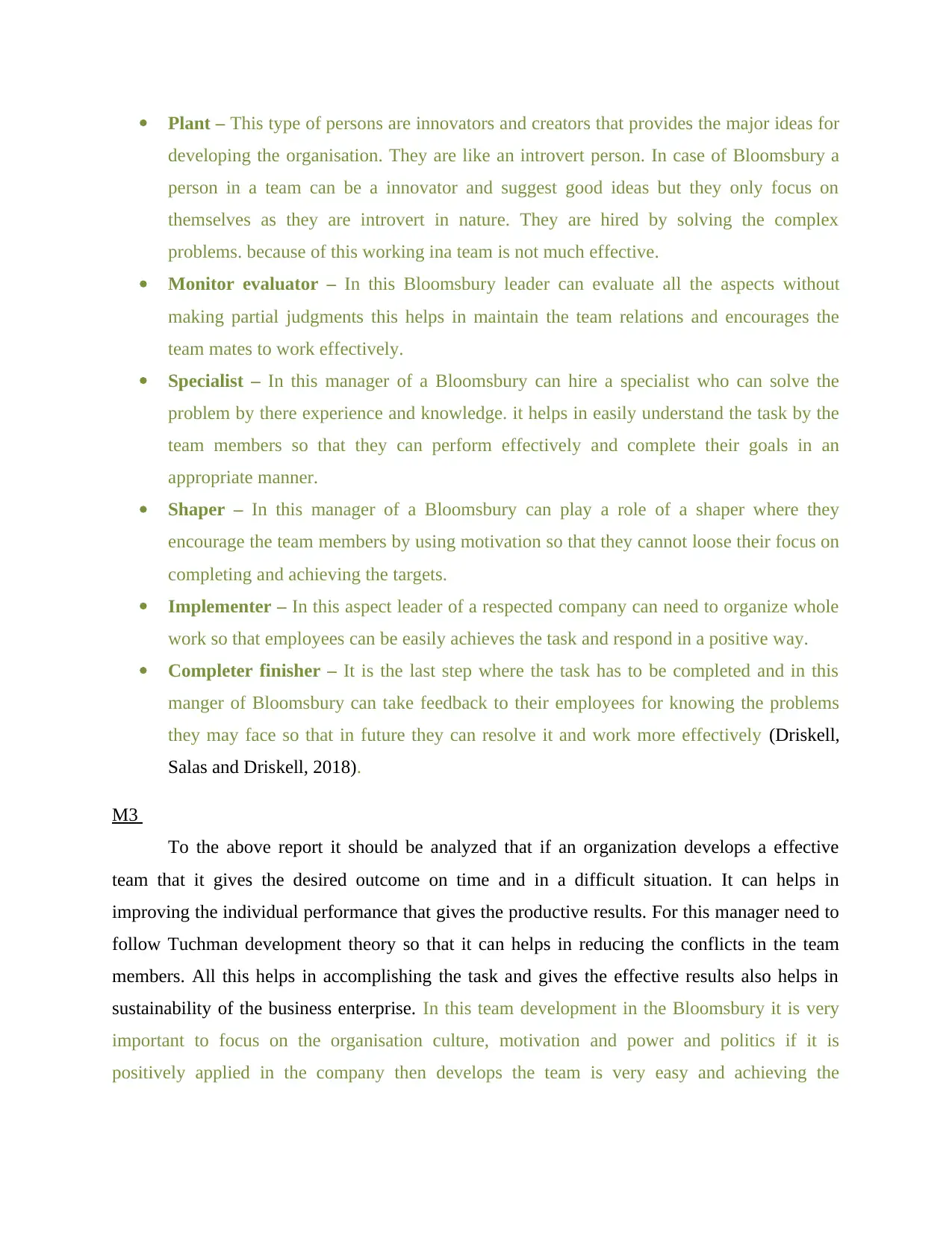
Plant – This type of persons are innovators and creators that provides the major ideas for
developing the organisation. They are like an introvert person. In case of Bloomsbury a
person in a team can be a innovator and suggest good ideas but they only focus on
themselves as they are introvert in nature. They are hired by solving the complex
problems. because of this working ina team is not much effective.
Monitor evaluator – In this Bloomsbury leader can evaluate all the aspects without
making partial judgments this helps in maintain the team relations and encourages the
team mates to work effectively.
Specialist – In this manager of a Bloomsbury can hire a specialist who can solve the
problem by there experience and knowledge. it helps in easily understand the task by the
team members so that they can perform effectively and complete their goals in an
appropriate manner.
Shaper – In this manager of a Bloomsbury can play a role of a shaper where they
encourage the team members by using motivation so that they cannot loose their focus on
completing and achieving the targets.
Implementer – In this aspect leader of a respected company can need to organize whole
work so that employees can be easily achieves the task and respond in a positive way.
Completer finisher – It is the last step where the task has to be completed and in this
manger of Bloomsbury can take feedback to their employees for knowing the problems
they may face so that in future they can resolve it and work more effectively (Driskell,
Salas and Driskell, 2018).
M3
To the above report it should be analyzed that if an organization develops a effective
team that it gives the desired outcome on time and in a difficult situation. It can helps in
improving the individual performance that gives the productive results. For this manager need to
follow Tuchman development theory so that it can helps in reducing the conflicts in the team
members. All this helps in accomplishing the task and gives the effective results also helps in
sustainability of the business enterprise. In this team development in the Bloomsbury it is very
important to focus on the organisation culture, motivation and power and politics if it is
positively applied in the company then develops the team is very easy and achieving the
developing the organisation. They are like an introvert person. In case of Bloomsbury a
person in a team can be a innovator and suggest good ideas but they only focus on
themselves as they are introvert in nature. They are hired by solving the complex
problems. because of this working ina team is not much effective.
Monitor evaluator – In this Bloomsbury leader can evaluate all the aspects without
making partial judgments this helps in maintain the team relations and encourages the
team mates to work effectively.
Specialist – In this manager of a Bloomsbury can hire a specialist who can solve the
problem by there experience and knowledge. it helps in easily understand the task by the
team members so that they can perform effectively and complete their goals in an
appropriate manner.
Shaper – In this manager of a Bloomsbury can play a role of a shaper where they
encourage the team members by using motivation so that they cannot loose their focus on
completing and achieving the targets.
Implementer – In this aspect leader of a respected company can need to organize whole
work so that employees can be easily achieves the task and respond in a positive way.
Completer finisher – It is the last step where the task has to be completed and in this
manger of Bloomsbury can take feedback to their employees for knowing the problems
they may face so that in future they can resolve it and work more effectively (Driskell,
Salas and Driskell, 2018).
M3
To the above report it should be analyzed that if an organization develops a effective
team that it gives the desired outcome on time and in a difficult situation. It can helps in
improving the individual performance that gives the productive results. For this manager need to
follow Tuchman development theory so that it can helps in reducing the conflicts in the team
members. All this helps in accomplishing the task and gives the effective results also helps in
sustainability of the business enterprise. In this team development in the Bloomsbury it is very
important to focus on the organisation culture, motivation and power and politics if it is
positively applied in the company then develops the team is very easy and achieving the
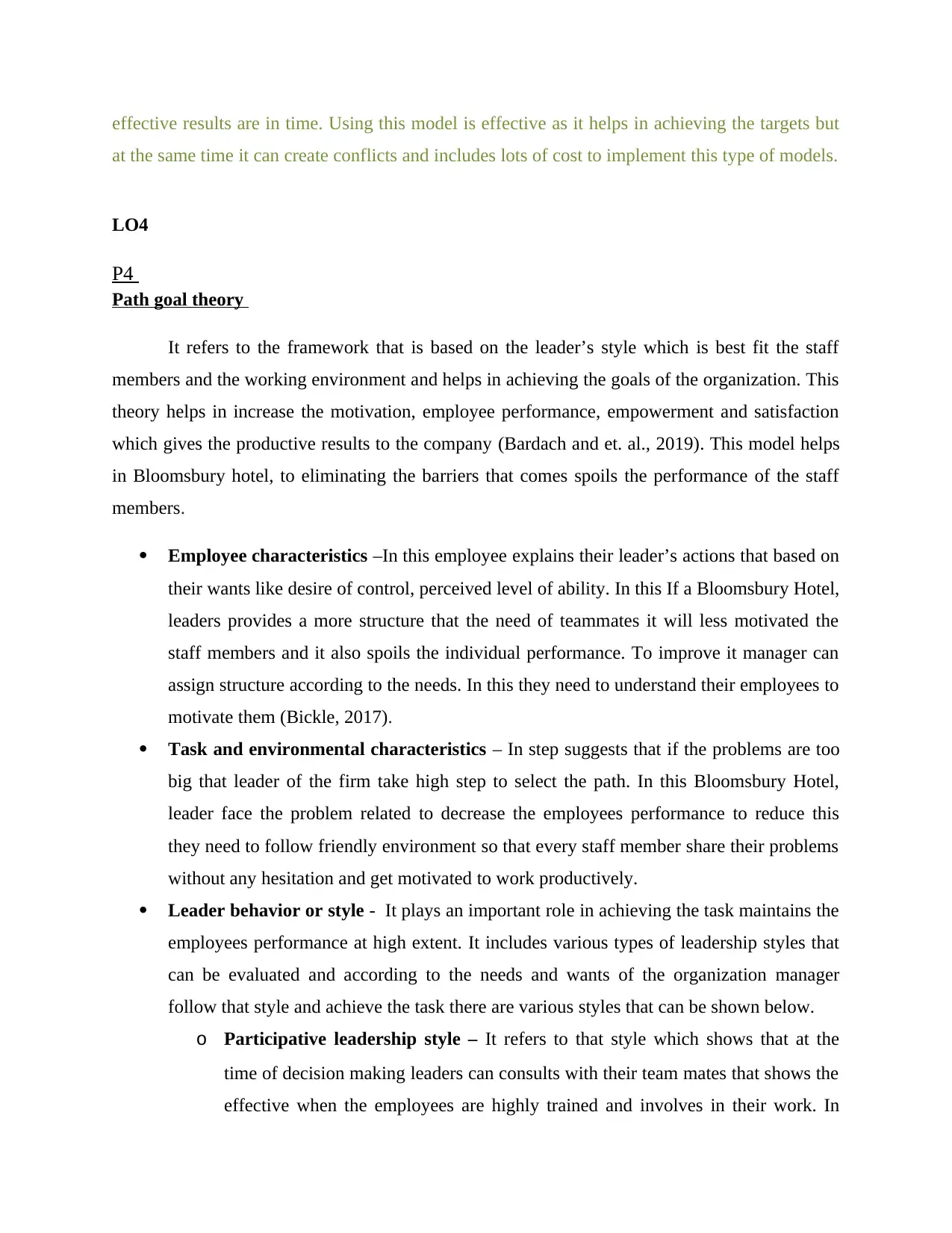
effective results are in time. Using this model is effective as it helps in achieving the targets but
at the same time it can create conflicts and includes lots of cost to implement this type of models.
LO4
P4
Path goal theory
It refers to the framework that is based on the leader’s style which is best fit the staff
members and the working environment and helps in achieving the goals of the organization. This
theory helps in increase the motivation, employee performance, empowerment and satisfaction
which gives the productive results to the company (Bardach and et. al., 2019). This model helps
in Bloomsbury hotel, to eliminating the barriers that comes spoils the performance of the staff
members.
Employee characteristics –In this employee explains their leader’s actions that based on
their wants like desire of control, perceived level of ability. In this If a Bloomsbury Hotel,
leaders provides a more structure that the need of teammates it will less motivated the
staff members and it also spoils the individual performance. To improve it manager can
assign structure according to the needs. In this they need to understand their employees to
motivate them (Bickle, 2017).
Task and environmental characteristics – In step suggests that if the problems are too
big that leader of the firm take high step to select the path. In this Bloomsbury Hotel,
leader face the problem related to decrease the employees performance to reduce this
they need to follow friendly environment so that every staff member share their problems
without any hesitation and get motivated to work productively.
Leader behavior or style - It plays an important role in achieving the task maintains the
employees performance at high extent. It includes various types of leadership styles that
can be evaluated and according to the needs and wants of the organization manager
follow that style and achieve the task there are various styles that can be shown below.
o Participative leadership style – It refers to that style which shows that at the
time of decision making leaders can consults with their team mates that shows the
effective when the employees are highly trained and involves in their work. In
at the same time it can create conflicts and includes lots of cost to implement this type of models.
LO4
P4
Path goal theory
It refers to the framework that is based on the leader’s style which is best fit the staff
members and the working environment and helps in achieving the goals of the organization. This
theory helps in increase the motivation, employee performance, empowerment and satisfaction
which gives the productive results to the company (Bardach and et. al., 2019). This model helps
in Bloomsbury hotel, to eliminating the barriers that comes spoils the performance of the staff
members.
Employee characteristics –In this employee explains their leader’s actions that based on
their wants like desire of control, perceived level of ability. In this If a Bloomsbury Hotel,
leaders provides a more structure that the need of teammates it will less motivated the
staff members and it also spoils the individual performance. To improve it manager can
assign structure according to the needs. In this they need to understand their employees to
motivate them (Bickle, 2017).
Task and environmental characteristics – In step suggests that if the problems are too
big that leader of the firm take high step to select the path. In this Bloomsbury Hotel,
leader face the problem related to decrease the employees performance to reduce this
they need to follow friendly environment so that every staff member share their problems
without any hesitation and get motivated to work productively.
Leader behavior or style - It plays an important role in achieving the task maintains the
employees performance at high extent. It includes various types of leadership styles that
can be evaluated and according to the needs and wants of the organization manager
follow that style and achieve the task there are various styles that can be shown below.
o Participative leadership style – It refers to that style which shows that at the
time of decision making leaders can consults with their team mates that shows the
effective when the employees are highly trained and involves in their work. In
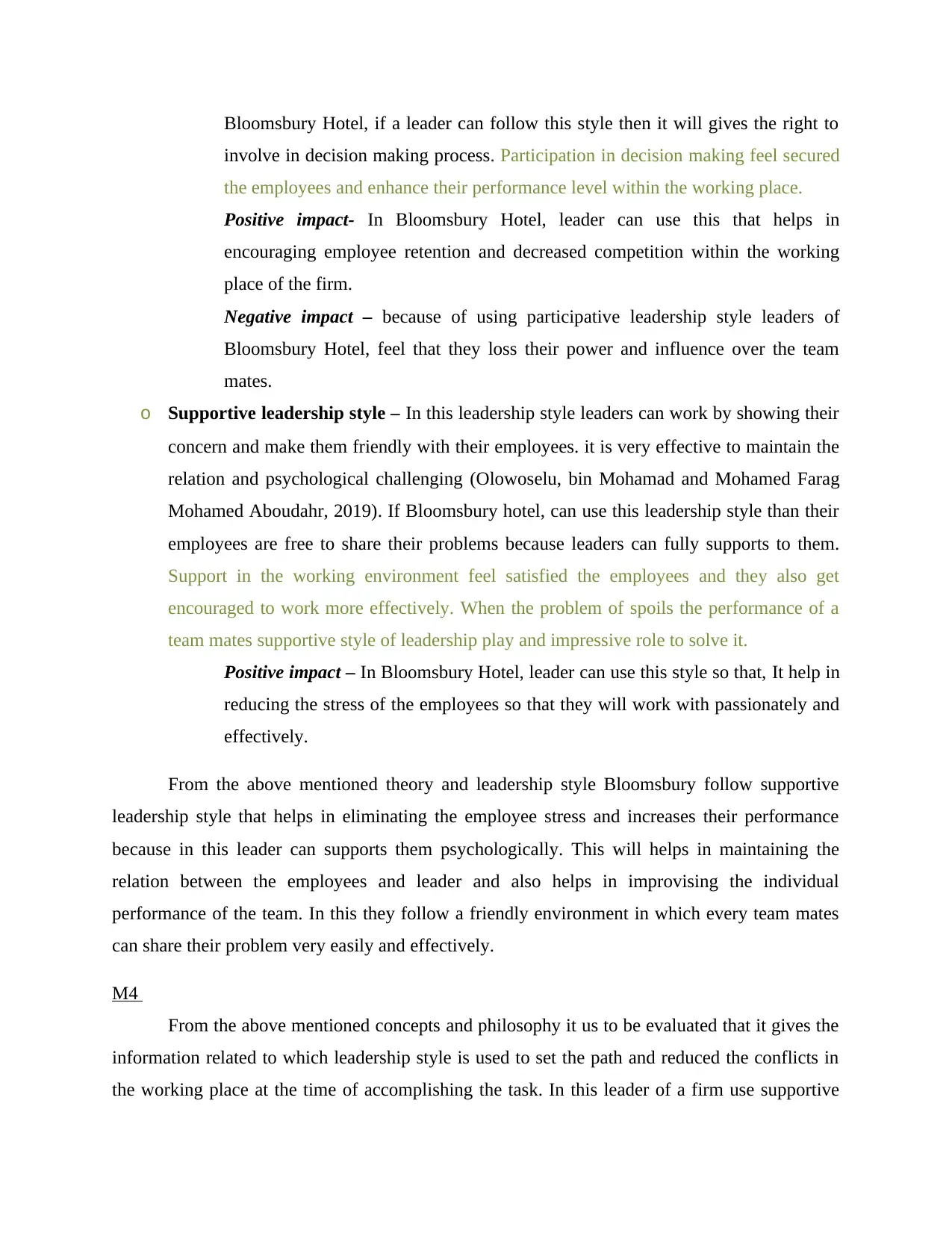
Bloomsbury Hotel, if a leader can follow this style then it will gives the right to
involve in decision making process. Participation in decision making feel secured
the employees and enhance their performance level within the working place.
Positive impact- In Bloomsbury Hotel, leader can use this that helps in
encouraging employee retention and decreased competition within the working
place of the firm.
Negative impact – because of using participative leadership style leaders of
Bloomsbury Hotel, feel that they loss their power and influence over the team
mates.
o Supportive leadership style – In this leadership style leaders can work by showing their
concern and make them friendly with their employees. it is very effective to maintain the
relation and psychological challenging (Olowoselu, bin Mohamad and Mohamed Farag
Mohamed Aboudahr, 2019). If Bloomsbury hotel, can use this leadership style than their
employees are free to share their problems because leaders can fully supports to them.
Support in the working environment feel satisfied the employees and they also get
encouraged to work more effectively. When the problem of spoils the performance of a
team mates supportive style of leadership play and impressive role to solve it.
Positive impact – In Bloomsbury Hotel, leader can use this style so that, It help in
reducing the stress of the employees so that they will work with passionately and
effectively.
From the above mentioned theory and leadership style Bloomsbury follow supportive
leadership style that helps in eliminating the employee stress and increases their performance
because in this leader can supports them psychologically. This will helps in maintaining the
relation between the employees and leader and also helps in improvising the individual
performance of the team. In this they follow a friendly environment in which every team mates
can share their problem very easily and effectively.
M4
From the above mentioned concepts and philosophy it us to be evaluated that it gives the
information related to which leadership style is used to set the path and reduced the conflicts in
the working place at the time of accomplishing the task. In this leader of a firm use supportive
involve in decision making process. Participation in decision making feel secured
the employees and enhance their performance level within the working place.
Positive impact- In Bloomsbury Hotel, leader can use this that helps in
encouraging employee retention and decreased competition within the working
place of the firm.
Negative impact – because of using participative leadership style leaders of
Bloomsbury Hotel, feel that they loss their power and influence over the team
mates.
o Supportive leadership style – In this leadership style leaders can work by showing their
concern and make them friendly with their employees. it is very effective to maintain the
relation and psychological challenging (Olowoselu, bin Mohamad and Mohamed Farag
Mohamed Aboudahr, 2019). If Bloomsbury hotel, can use this leadership style than their
employees are free to share their problems because leaders can fully supports to them.
Support in the working environment feel satisfied the employees and they also get
encouraged to work more effectively. When the problem of spoils the performance of a
team mates supportive style of leadership play and impressive role to solve it.
Positive impact – In Bloomsbury Hotel, leader can use this style so that, It help in
reducing the stress of the employees so that they will work with passionately and
effectively.
From the above mentioned theory and leadership style Bloomsbury follow supportive
leadership style that helps in eliminating the employee stress and increases their performance
because in this leader can supports them psychologically. This will helps in maintaining the
relation between the employees and leader and also helps in improvising the individual
performance of the team. In this they follow a friendly environment in which every team mates
can share their problem very easily and effectively.
M4
From the above mentioned concepts and philosophy it us to be evaluated that it gives the
information related to which leadership style is used to set the path and reduced the conflicts in
the working place at the time of accomplishing the task. In this leader of a firm use supportive
Secure Best Marks with AI Grader
Need help grading? Try our AI Grader for instant feedback on your assignments.
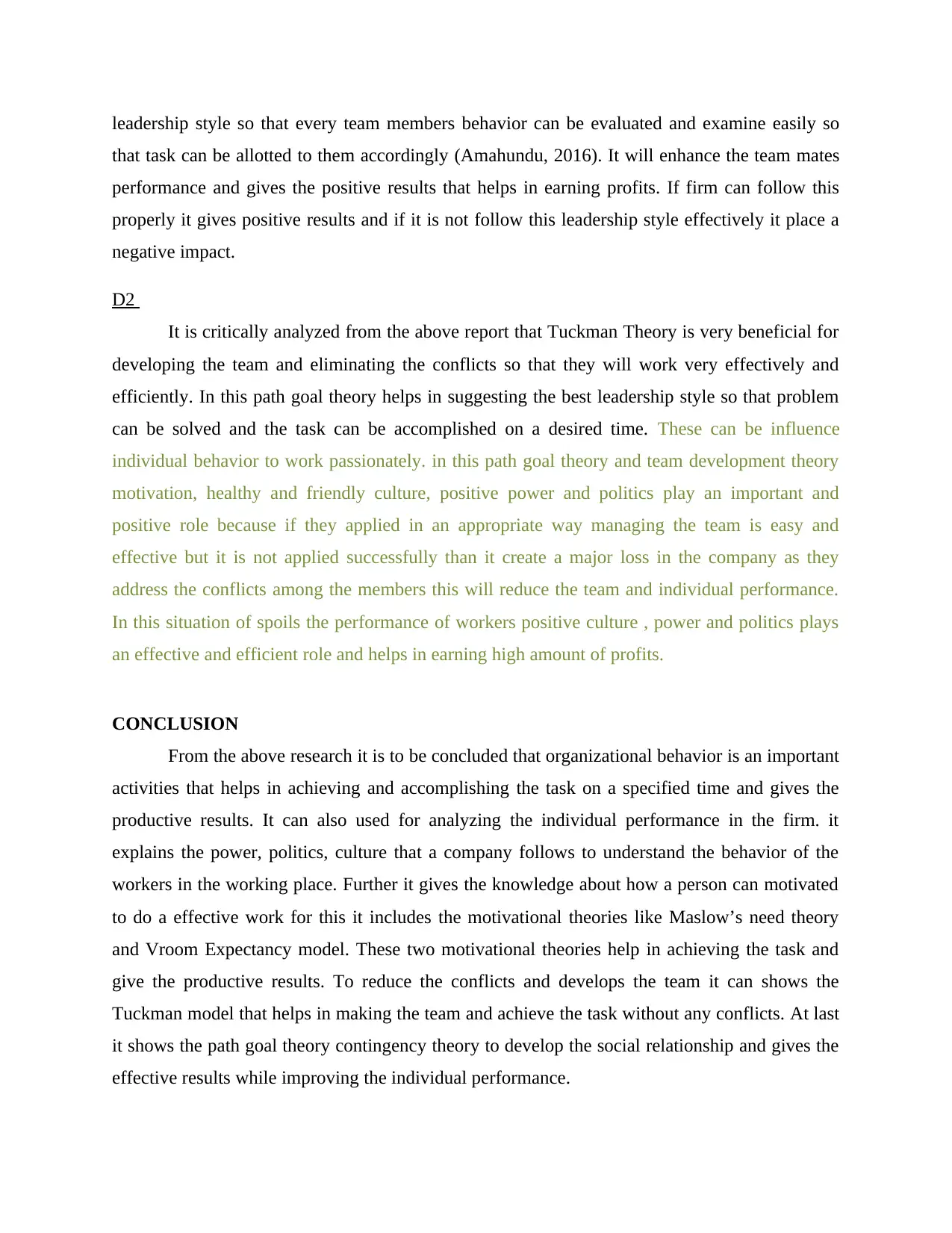
leadership style so that every team members behavior can be evaluated and examine easily so
that task can be allotted to them accordingly (Amahundu, 2016). It will enhance the team mates
performance and gives the positive results that helps in earning profits. If firm can follow this
properly it gives positive results and if it is not follow this leadership style effectively it place a
negative impact.
D2
It is critically analyzed from the above report that Tuckman Theory is very beneficial for
developing the team and eliminating the conflicts so that they will work very effectively and
efficiently. In this path goal theory helps in suggesting the best leadership style so that problem
can be solved and the task can be accomplished on a desired time. These can be influence
individual behavior to work passionately. in this path goal theory and team development theory
motivation, healthy and friendly culture, positive power and politics play an important and
positive role because if they applied in an appropriate way managing the team is easy and
effective but it is not applied successfully than it create a major loss in the company as they
address the conflicts among the members this will reduce the team and individual performance.
In this situation of spoils the performance of workers positive culture , power and politics plays
an effective and efficient role and helps in earning high amount of profits.
CONCLUSION
From the above research it is to be concluded that organizational behavior is an important
activities that helps in achieving and accomplishing the task on a specified time and gives the
productive results. It can also used for analyzing the individual performance in the firm. it
explains the power, politics, culture that a company follows to understand the behavior of the
workers in the working place. Further it gives the knowledge about how a person can motivated
to do a effective work for this it includes the motivational theories like Maslow’s need theory
and Vroom Expectancy model. These two motivational theories help in achieving the task and
give the productive results. To reduce the conflicts and develops the team it can shows the
Tuckman model that helps in making the team and achieve the task without any conflicts. At last
it shows the path goal theory contingency theory to develop the social relationship and gives the
effective results while improving the individual performance.
that task can be allotted to them accordingly (Amahundu, 2016). It will enhance the team mates
performance and gives the positive results that helps in earning profits. If firm can follow this
properly it gives positive results and if it is not follow this leadership style effectively it place a
negative impact.
D2
It is critically analyzed from the above report that Tuckman Theory is very beneficial for
developing the team and eliminating the conflicts so that they will work very effectively and
efficiently. In this path goal theory helps in suggesting the best leadership style so that problem
can be solved and the task can be accomplished on a desired time. These can be influence
individual behavior to work passionately. in this path goal theory and team development theory
motivation, healthy and friendly culture, positive power and politics play an important and
positive role because if they applied in an appropriate way managing the team is easy and
effective but it is not applied successfully than it create a major loss in the company as they
address the conflicts among the members this will reduce the team and individual performance.
In this situation of spoils the performance of workers positive culture , power and politics plays
an effective and efficient role and helps in earning high amount of profits.
CONCLUSION
From the above research it is to be concluded that organizational behavior is an important
activities that helps in achieving and accomplishing the task on a specified time and gives the
productive results. It can also used for analyzing the individual performance in the firm. it
explains the power, politics, culture that a company follows to understand the behavior of the
workers in the working place. Further it gives the knowledge about how a person can motivated
to do a effective work for this it includes the motivational theories like Maslow’s need theory
and Vroom Expectancy model. These two motivational theories help in achieving the task and
give the productive results. To reduce the conflicts and develops the team it can shows the
Tuckman model that helps in making the team and achieve the task without any conflicts. At last
it shows the path goal theory contingency theory to develop the social relationship and gives the
effective results while improving the individual performance.

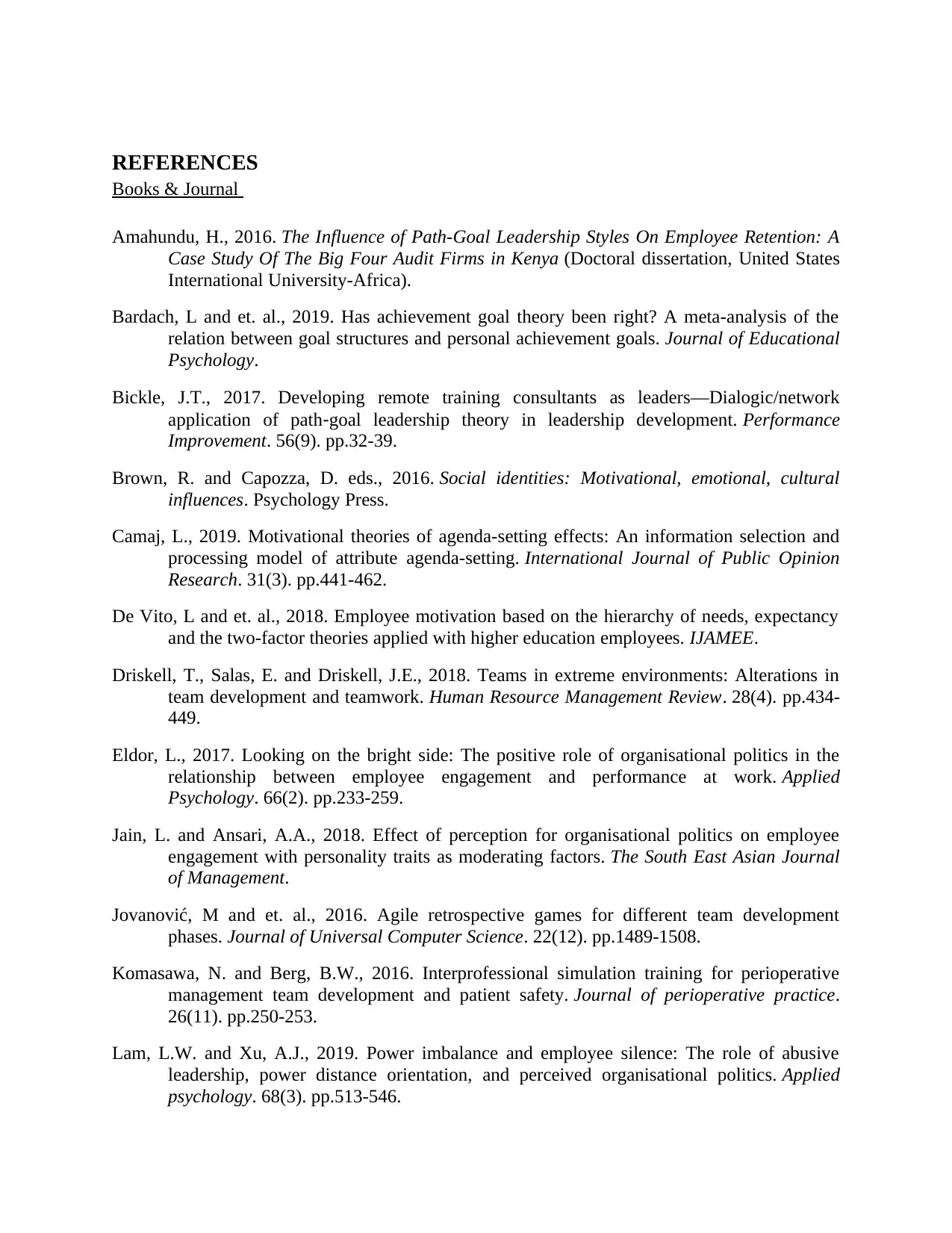
REFERENCES
Books & Journal
Amahundu, H., 2016. The Influence of Path-Goal Leadership Styles On Employee Retention: A
Case Study Of The Big Four Audit Firms in Kenya (Doctoral dissertation, United States
International University-Africa).
Bardach, L and et. al., 2019. Has achievement goal theory been right? A meta-analysis of the
relation between goal structures and personal achievement goals. Journal of Educational
Psychology.
Bickle, J.T., 2017. Developing remote training consultants as leaders—Dialogic/network
application of path‐goal leadership theory in leadership development. Performance
Improvement. 56(9). pp.32-39.
Brown, R. and Capozza, D. eds., 2016. Social identities: Motivational, emotional, cultural
influences. Psychology Press.
Camaj, L., 2019. Motivational theories of agenda-setting effects: An information selection and
processing model of attribute agenda-setting. International Journal of Public Opinion
Research. 31(3). pp.441-462.
De Vito, L and et. al., 2018. Employee motivation based on the hierarchy of needs, expectancy
and the two-factor theories applied with higher education employees. IJAMEE.
Driskell, T., Salas, E. and Driskell, J.E., 2018. Teams in extreme environments: Alterations in
team development and teamwork. Human Resource Management Review. 28(4). pp.434-
449.
Eldor, L., 2017. Looking on the bright side: The positive role of organisational politics in the
relationship between employee engagement and performance at work. Applied
Psychology. 66(2). pp.233-259.
Jain, L. and Ansari, A.A., 2018. Effect of perception for organisational politics on employee
engagement with personality traits as moderating factors. The South East Asian Journal
of Management.
Jovanović, M and et. al., 2016. Agile retrospective games for different team development
phases. Journal of Universal Computer Science. 22(12). pp.1489-1508.
Komasawa, N. and Berg, B.W., 2016. Interprofessional simulation training for perioperative
management team development and patient safety. Journal of perioperative practice.
26(11). pp.250-253.
Lam, L.W. and Xu, A.J., 2019. Power imbalance and employee silence: The role of abusive
leadership, power distance orientation, and perceived organisational politics. Applied
psychology. 68(3). pp.513-546.
Books & Journal
Amahundu, H., 2016. The Influence of Path-Goal Leadership Styles On Employee Retention: A
Case Study Of The Big Four Audit Firms in Kenya (Doctoral dissertation, United States
International University-Africa).
Bardach, L and et. al., 2019. Has achievement goal theory been right? A meta-analysis of the
relation between goal structures and personal achievement goals. Journal of Educational
Psychology.
Bickle, J.T., 2017. Developing remote training consultants as leaders—Dialogic/network
application of path‐goal leadership theory in leadership development. Performance
Improvement. 56(9). pp.32-39.
Brown, R. and Capozza, D. eds., 2016. Social identities: Motivational, emotional, cultural
influences. Psychology Press.
Camaj, L., 2019. Motivational theories of agenda-setting effects: An information selection and
processing model of attribute agenda-setting. International Journal of Public Opinion
Research. 31(3). pp.441-462.
De Vito, L and et. al., 2018. Employee motivation based on the hierarchy of needs, expectancy
and the two-factor theories applied with higher education employees. IJAMEE.
Driskell, T., Salas, E. and Driskell, J.E., 2018. Teams in extreme environments: Alterations in
team development and teamwork. Human Resource Management Review. 28(4). pp.434-
449.
Eldor, L., 2017. Looking on the bright side: The positive role of organisational politics in the
relationship between employee engagement and performance at work. Applied
Psychology. 66(2). pp.233-259.
Jain, L. and Ansari, A.A., 2018. Effect of perception for organisational politics on employee
engagement with personality traits as moderating factors. The South East Asian Journal
of Management.
Jovanović, M and et. al., 2016. Agile retrospective games for different team development
phases. Journal of Universal Computer Science. 22(12). pp.1489-1508.
Komasawa, N. and Berg, B.W., 2016. Interprofessional simulation training for perioperative
management team development and patient safety. Journal of perioperative practice.
26(11). pp.250-253.
Lam, L.W. and Xu, A.J., 2019. Power imbalance and employee silence: The role of abusive
leadership, power distance orientation, and perceived organisational politics. Applied
psychology. 68(3). pp.513-546.
Paraphrase This Document
Need a fresh take? Get an instant paraphrase of this document with our AI Paraphraser
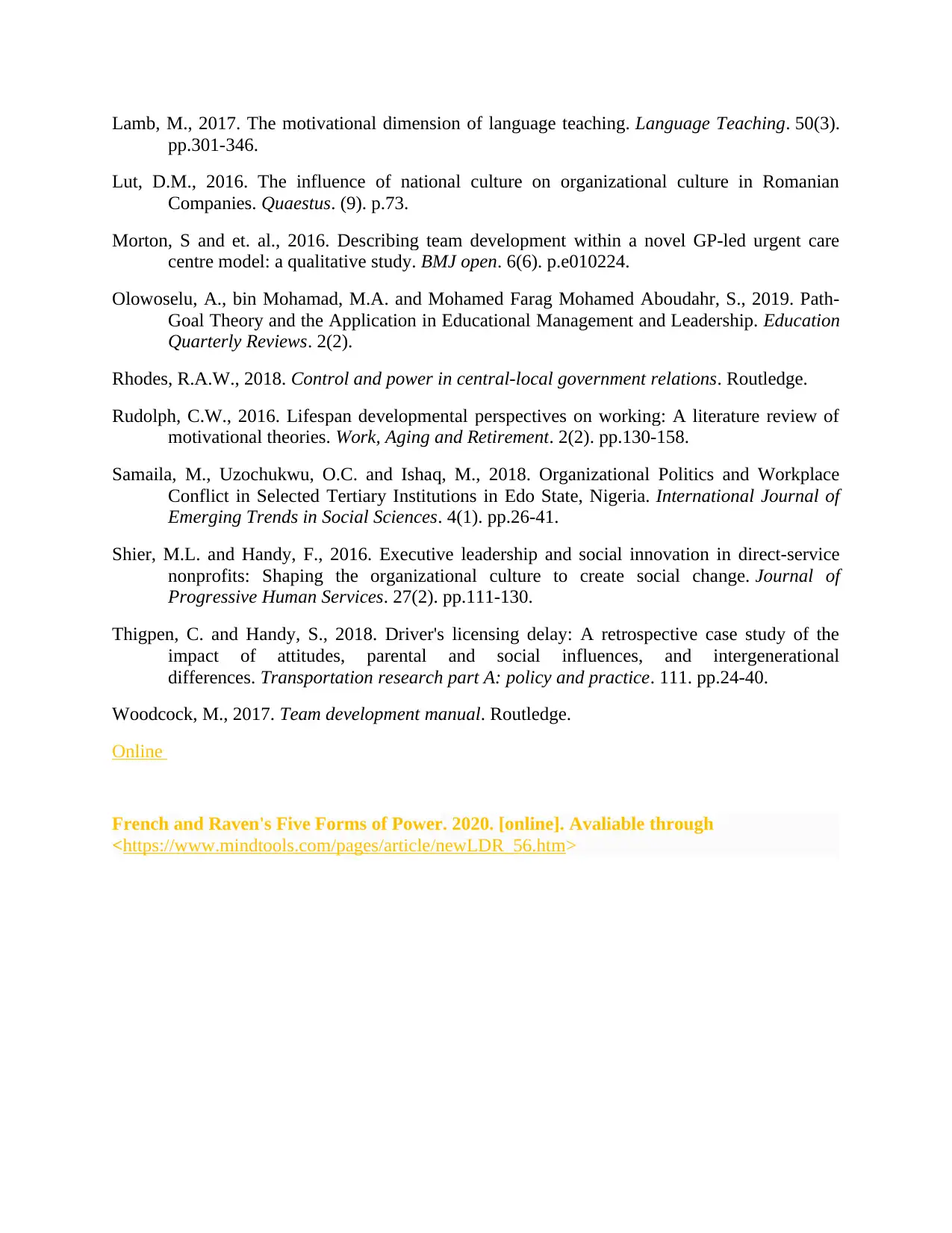
Lamb, M., 2017. The motivational dimension of language teaching. Language Teaching. 50(3).
pp.301-346.
Lut, D.M., 2016. The influence of national culture on organizational culture in Romanian
Companies. Quaestus. (9). p.73.
Morton, S and et. al., 2016. Describing team development within a novel GP-led urgent care
centre model: a qualitative study. BMJ open. 6(6). p.e010224.
Olowoselu, A., bin Mohamad, M.A. and Mohamed Farag Mohamed Aboudahr, S., 2019. Path-
Goal Theory and the Application in Educational Management and Leadership. Education
Quarterly Reviews. 2(2).
Rhodes, R.A.W., 2018. Control and power in central-local government relations. Routledge.
Rudolph, C.W., 2016. Lifespan developmental perspectives on working: A literature review of
motivational theories. Work, Aging and Retirement. 2(2). pp.130-158.
Samaila, M., Uzochukwu, O.C. and Ishaq, M., 2018. Organizational Politics and Workplace
Conflict in Selected Tertiary Institutions in Edo State, Nigeria. International Journal of
Emerging Trends in Social Sciences. 4(1). pp.26-41.
Shier, M.L. and Handy, F., 2016. Executive leadership and social innovation in direct-service
nonprofits: Shaping the organizational culture to create social change. Journal of
Progressive Human Services. 27(2). pp.111-130.
Thigpen, C. and Handy, S., 2018. Driver's licensing delay: A retrospective case study of the
impact of attitudes, parental and social influences, and intergenerational
differences. Transportation research part A: policy and practice. 111. pp.24-40.
Woodcock, M., 2017. Team development manual. Routledge.
Online
French and Raven's Five Forms of Power. 2020. [online]. Avaliable through
<https://www.mindtools.com/pages/article/newLDR_56.htm>
pp.301-346.
Lut, D.M., 2016. The influence of national culture on organizational culture in Romanian
Companies. Quaestus. (9). p.73.
Morton, S and et. al., 2016. Describing team development within a novel GP-led urgent care
centre model: a qualitative study. BMJ open. 6(6). p.e010224.
Olowoselu, A., bin Mohamad, M.A. and Mohamed Farag Mohamed Aboudahr, S., 2019. Path-
Goal Theory and the Application in Educational Management and Leadership. Education
Quarterly Reviews. 2(2).
Rhodes, R.A.W., 2018. Control and power in central-local government relations. Routledge.
Rudolph, C.W., 2016. Lifespan developmental perspectives on working: A literature review of
motivational theories. Work, Aging and Retirement. 2(2). pp.130-158.
Samaila, M., Uzochukwu, O.C. and Ishaq, M., 2018. Organizational Politics and Workplace
Conflict in Selected Tertiary Institutions in Edo State, Nigeria. International Journal of
Emerging Trends in Social Sciences. 4(1). pp.26-41.
Shier, M.L. and Handy, F., 2016. Executive leadership and social innovation in direct-service
nonprofits: Shaping the organizational culture to create social change. Journal of
Progressive Human Services. 27(2). pp.111-130.
Thigpen, C. and Handy, S., 2018. Driver's licensing delay: A retrospective case study of the
impact of attitudes, parental and social influences, and intergenerational
differences. Transportation research part A: policy and practice. 111. pp.24-40.
Woodcock, M., 2017. Team development manual. Routledge.
Online
French and Raven's Five Forms of Power. 2020. [online]. Avaliable through
<https://www.mindtools.com/pages/article/newLDR_56.htm>

1 out of 21
Related Documents
Your All-in-One AI-Powered Toolkit for Academic Success.
+13062052269
info@desklib.com
Available 24*7 on WhatsApp / Email
![[object Object]](/_next/static/media/star-bottom.7253800d.svg)
Unlock your academic potential
© 2024 | Zucol Services PVT LTD | All rights reserved.





